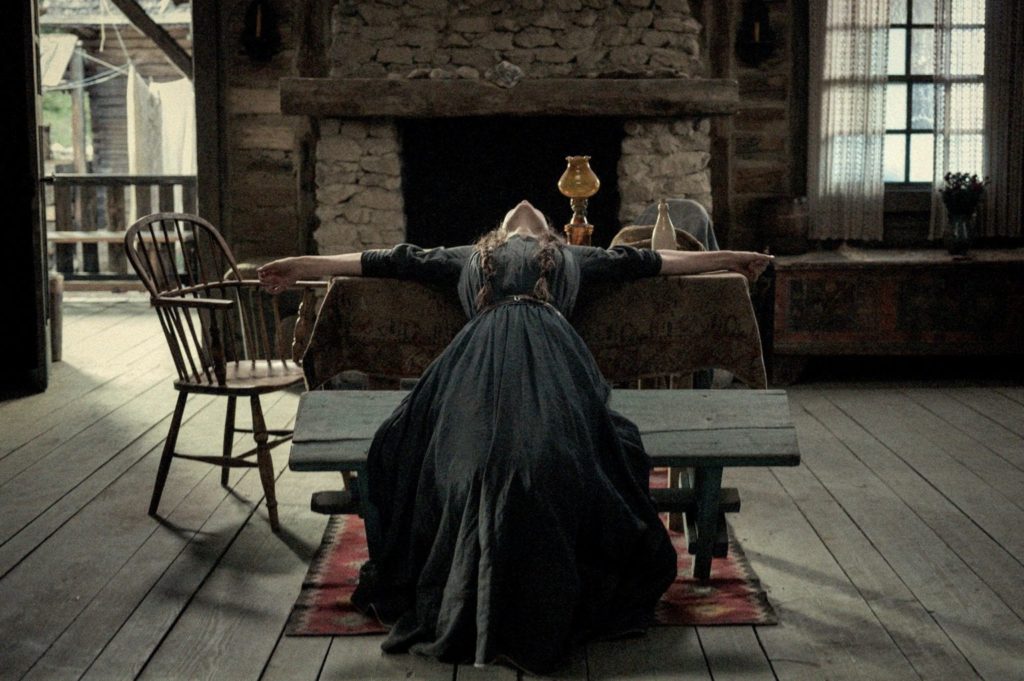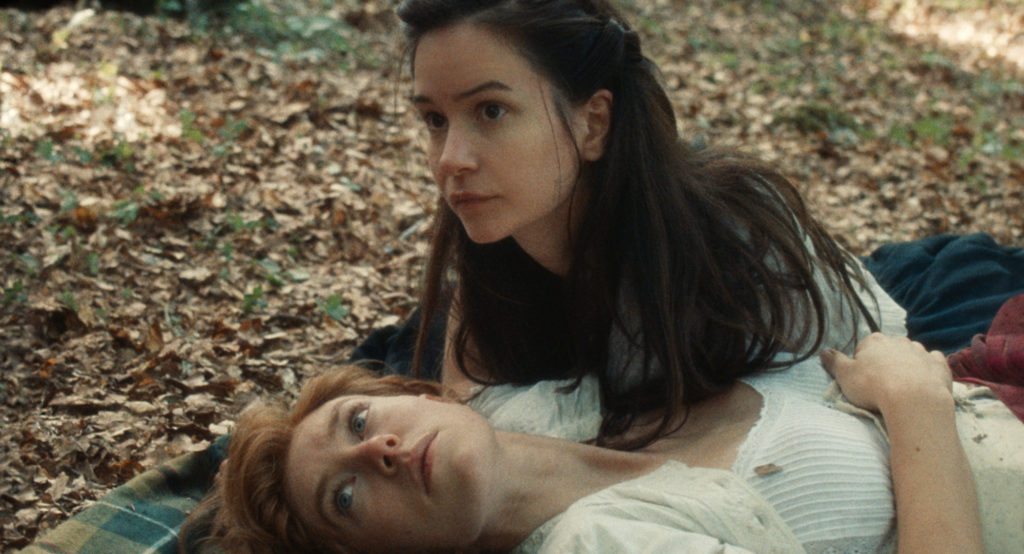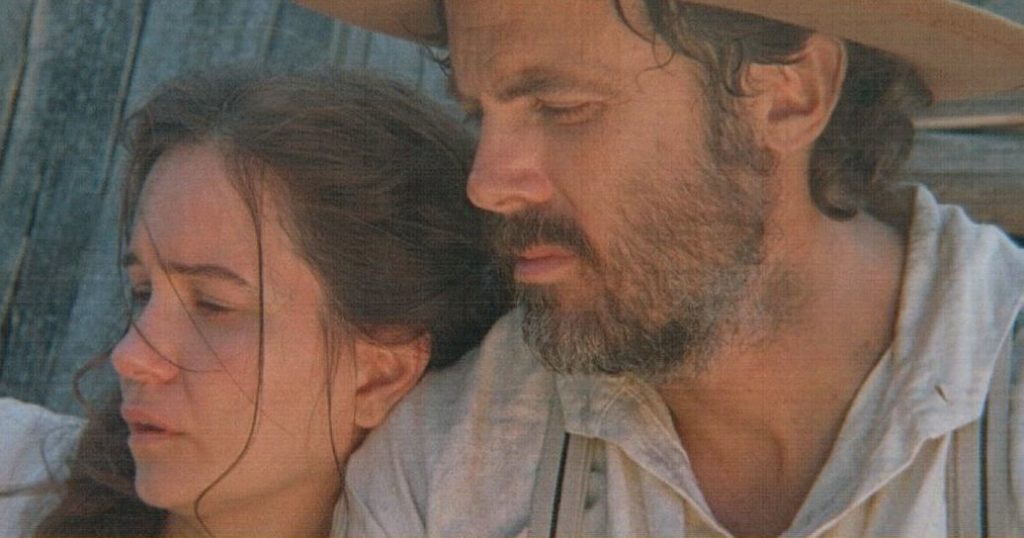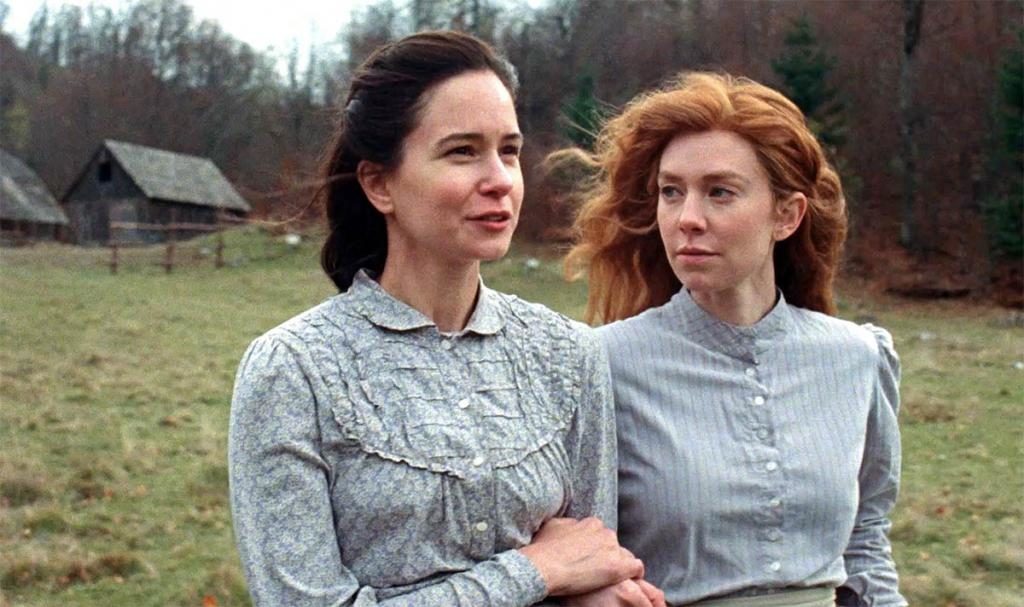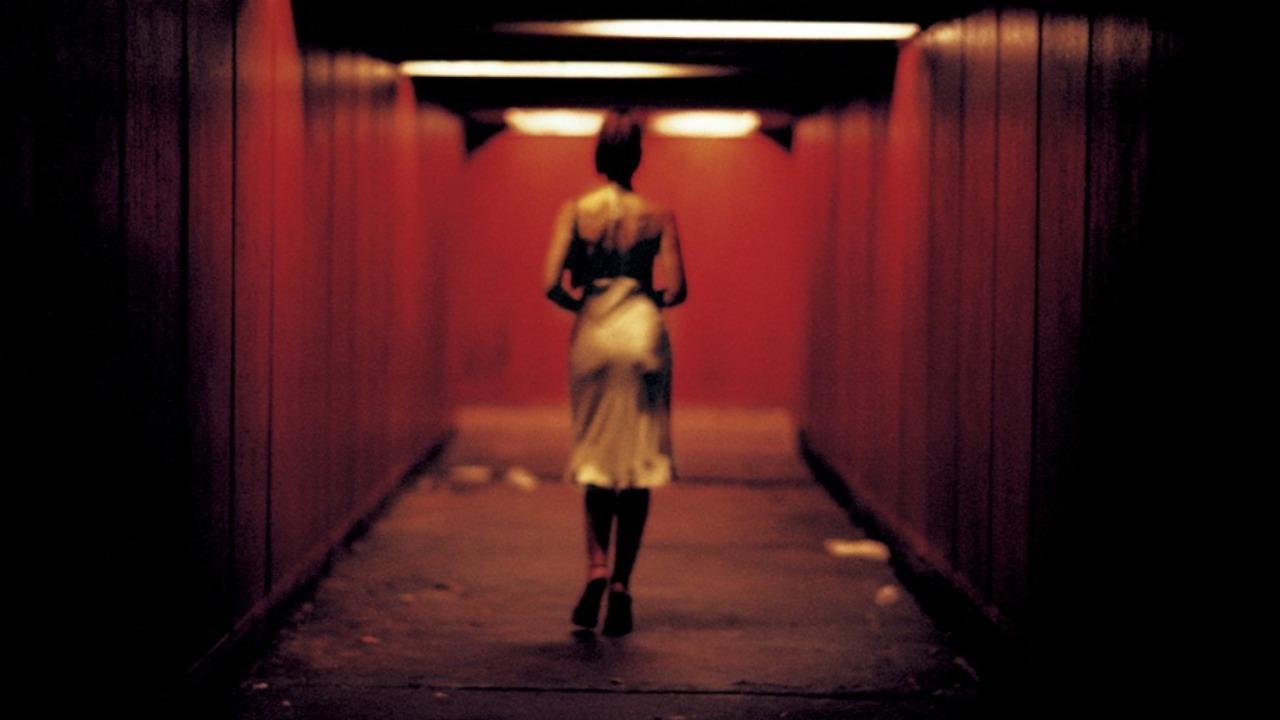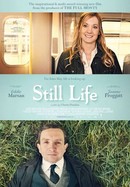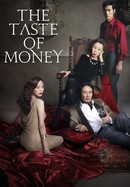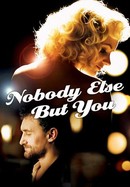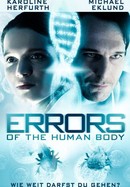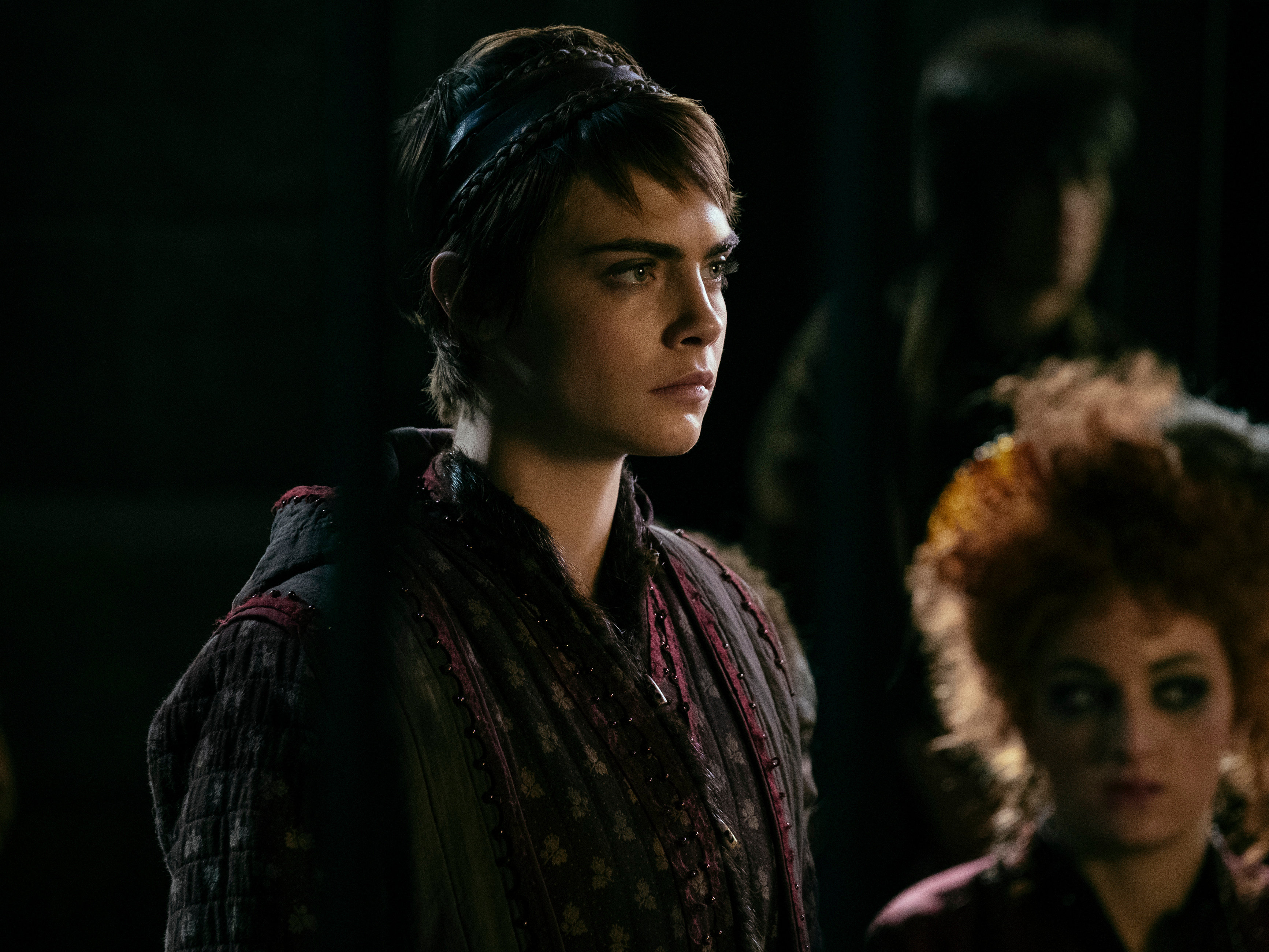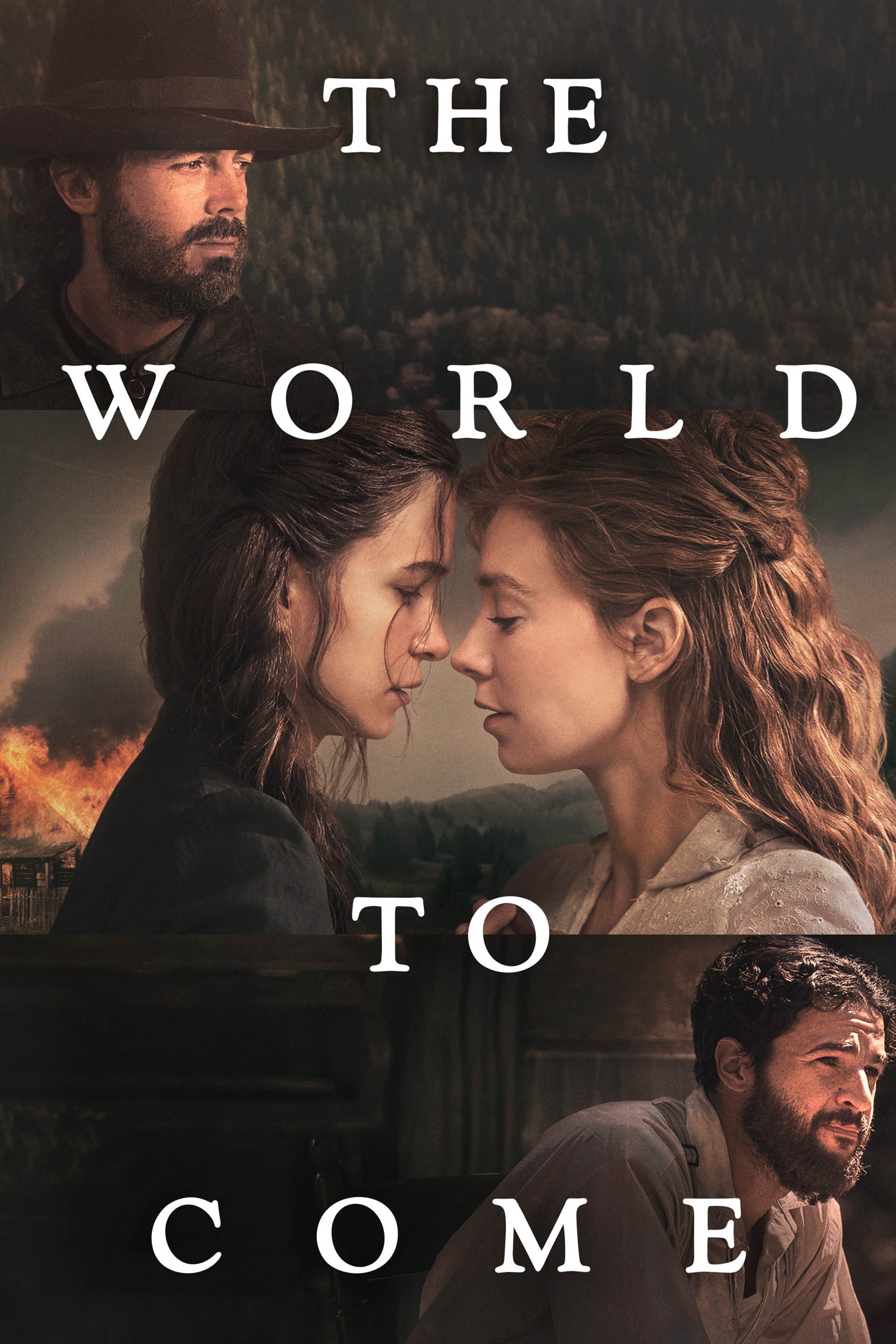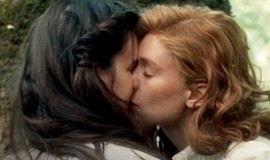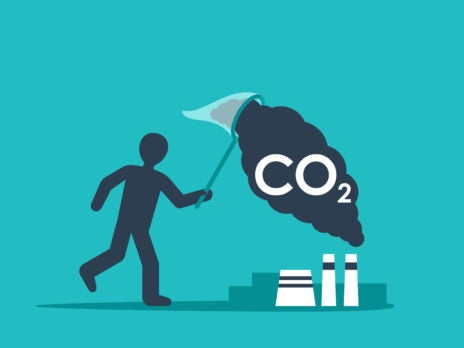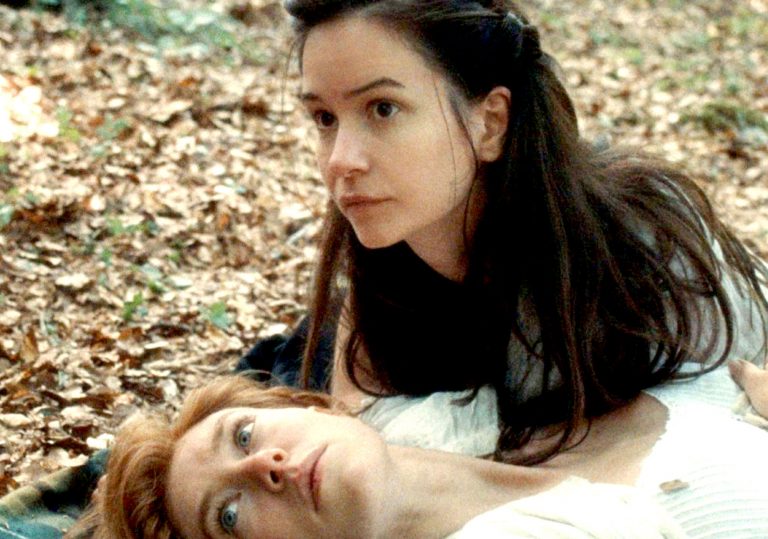The world to come
The world to come
«Мир грядущий»: дневник его жены


В рамках 15-го фестиваля американского кино AMFEST в кинотеатрах Москвы и Санкт-Петербурга состоятся премьерные показы в России картины «Мир Грядущий», до этого отмеченной специальной премией Венецианского кинофестиваля. Настасья Горбачевская рассказывает о фильме.
«Мир Грядущий» / The World to come (2020)
Режиссер: Мона Фастволд Лерче
Сценарий: Рон Хансен, Джим Шепард
Оператор: Андре Шеметофф
Продюсеры: Памела Коффлер, Кейси Аффлек, Илья Стюарт и др.
Он ведет учетную книгу: сколько сена ушло на корм коровам, достаточно ли яиц снесли куры и каким был заработок во время последней поездки на рынок — в этой тетради «ни единой записи о наших чувствах или страхах».
Она ведет дневник: по страницам чернильными буквами летит все не проговоренное, затаенное и болезненное. «1-е января 1856 года. Ясно и очень холодно…» — впереди еще один год смены сезонов, мороза и тепла, сквозняков внутри и вне стен деревянной хижины, затерянной где-то в лесах штата Нью-Йорк.
Слова дневника неторопливо и безрадостно зачитывает Эбигейл (Кэтрин Уотерстон), будто держа в руках книгу-первоисточник: одноименный рассказ своего же авторства Джим Шепард адаптировал к экрану вместе с Роном Хансеном. В голосе уставшей женщины сквозит одновременно тревожное предчувствие и звенящая апатия к тому самому миру грядущему. Эбигейл и ее мужу Дейеру (Кейси Аффлек) предстоит не только выжить в ледяных тисках суровых пейзажей, но и примириться со льдом внутри и между: прошлой осенью дифтерия унесла жизнь их единственной дочери Нелли, которая не отпраздновала и пятого дня рождения.
Серость, стужа, медлительная партитура фермерской жизни: коровье молоко, поля, дрова, консервы на зиму из яблок. Ярким пятном пылающей копны рыжих волос в их рутину ворвется Талли (Ванесса Кирби) — вместе с мужем Финни (Кристофер Эббот) они принялись обживать дом по соседству. Так начинается история печальной любви.
Постановщица Мона Фастволд Лерче не просто так не равнодушна к словам, ритмике и их произношению, она — автор сценариев в том числе к фильмам Брэйди Корбета. В «Vox Lux» Фастволд пыталась определить место женщины и травмы (личной и общей) в медиа пространстве и жизни образца 21 века. Теперь, встав на режиссерское место (не впервые, ее дебют «Лунатик» вышел в 2014 году), она отматывает время назад. Грядущий мир сегодня уже наступил (по крайней мере, порой так кажется), каким же был мир предшествующий в глазах смотрящей на него женщины?
Между Талли и Эбигейл неторопливо, тоскливо и неминуемо зарождается чувство — где-то между стихами и дружбой пробуждается и любовь. Их отношения похожи на тягучий вальс печальных душ — словами и паузами, намеками и взглядами два одиночества ищут поддержки в объятиях друг друга. Феминистский дискурс и бытовое проговаривание брака не по любви, рождения детей и тягот фермерского труда не выносит мужчин за скобки кинематографического полотна. Финни собрал в себе все болезненные нарывы патриархата: пока Талли, сидя за общим столом, пугливо прячет синяки на шее, он самозабвенно рассказывает как «воспитывал» пса, пока тот не окоченел до смерти. В отличие от него, Дейер — человек не менее одинокий и ранимый, чем его жена: фермер с тягой к точным наукам умеет вести свою тетрадь, но совсем не знает, какими словами выражаются чувства. «Стерпится, слюбится» — приговаривала мать Эбигейл, та ей верила, но этого не случилось: двое вынужденно живут под одной крышей, имея лишь приблизительное представление друг о друге.
Премьера фильма прошла на фестивале в Венеции, главный приз обошел картину стороной, но Фастволд увезла Голубого Льва — специальную награду, посвященную квир-проблематике на экране. Проще всего назвать «Мир Грядущего» внебрачным ребенком «Портрета девушки в огне» Селин Сьяммы и «Не состарится» Ивана Кэвэна.
Фильм демонстрируется в кинотеатрах Москвы и Санкт-Петербурга в рамках фестиваля американского кино Амфест:
сеансы в Москве
13 октября, вторник
20:00 КАРО 11 Октябрь
сеансы в Спб
23 октября, пятница
18:30 Аврора
Тоска и патриархат: рецензия на фильм «Мир грядущий»
Для режиссерки Моны Фаствольд Лерче драма «Мир грядущий» стала всего лишь второй по счету в ее послужном списке, где, в частности, имеются сценарии к двум громким картинам Брэйди Корбета – «Детство лидера» и «Вокс Люкс». Однако то, чем был так богат кинематограф Корбета – интеллектуальное нахальство и кинематографическая насмотренность вкупе с более-менее вменяемым киноязыком – у Моны Фаствольд Лерче можно обнаружить разве что с увеличительным стеклом, да и то не факт.
«Мир грядущий» – этически правильное, но эстетически совершенно никудышное кино. Драму о раскрытии женской сексуальности с лесбийским привкусом оно сводит к страданиям юного Вертера, пересказанным зумером с дислексией и заиканием одновременно. Можно, конечно, вменить фильму некое сомнительное желание ревизии вестернов с их маскулинной фактурой и выведением за скобки женщин как таковых. Сейчас это скорее норма, чем инноваций. Однако «Мир грядущий» всю эту жесткую фактуру использует лениво и вхолостую, опускаясь до уровня предсказуемой драмы про обреченные однополые отношения.
Частенько возникает ощущение, что оператора картины Андре Шеметоффа гораздо сильнее интересует всякая флора и фауна, столь щедро окружающая и как бы подавляющая всем своим естеством героев. Крепкие дубы с клёнами и осинами, осенняя листва на влажной земле, мудрые выражения морд разнообразной фермерской живности. В фильме фауна появляется эпизодически, но жизни и энтузиазма в глазах коров, свиней или куриц, к счастью, больше чем у четверых главных героев, переживающих тяжёлый лесбийский роман и потенциальный броманс между Дайером и Финни который, увы, так и не происходит. Во всяком случае, если бы в сюжете ленты случился хотя бы минимальный гомосексуальный рецидив в противовес имеющемуся лесбийскому, «Мир грядущий» можно было бы отнести даже к высокому китчу. А так вышел китч скучный и напыщенный, хотя и далекий от самопародийности в чем-то похожей по духу драмы «Аммонит» Фрэнсиса Ли.
Ритм фильма сбоит при любом удобном случае. Эбигейл и Талли несут крест патриархата и искалеченной сексуальности с таким видом, что, кажется, будто Иисус Христос принимал спа-процедуры во время собственного распятия, в отличие от героинь, которых фаллоцентричный социум ежесекундно распинает самым противоестественным способом.
«Мир грядущий» иллюстрирует ужасы патриархата занудными банальностями, которые кажутся по умолчанию хуже любого патриархата. Кинематограф все-таки искусство в первую очередь визуальное, но режиссерке Моне Фаствольд Лерче чрезвычайно важно подчеркивать с помощью демонстрации смен времен года психологическое состояние героев (прием уровня канала Hallmark или Интер) и пускать закадровые унылые монологи, будто написанные во время психологической терапии очень скучных людей. То, что в идеале должно присутствовать в кадре, звучит вне его, но то что звучит вне его, лучше бы не было озвучено вовсе ввиду своей пережеванной очевидности.
Холодные выцветшие сельские пейзажи буквально кричат о тоталитарной токсичной маскулинности, представленной в вечно суровых лицах Кейси Аффлека и Кристофера Эбботта. Актеры (особенно первый) способны сыграть и зияющую пустоту, но сценаристы ленты Джим Шеридан (его рассказ стал литературной основой сценария фильма) и Рон Хансен сводят роли и без того немногочисленных мужских персонажей картины к какой-то совсем уж оскорбительной декоративности. Из-за нее, собственно, не особо ясно, чем же так ужасны эти мужчины, кроме самого факта своего существования. Особенно карикатурным и доведенным до образа сферического мужлана из ночных кошмаров выглядит Финни, сыгранный Кристофером Эбботтом. Один из безусловных актеров-хамелеонов нынешнего американского инди-кинематографа выжимает максимум из своего героя, собранного как монстр доктора Франкенштейна, из всех штампов про мужчин-абьюзеров и насильников.
Такого рода упрощающий подход к драматургии, где в идеале должны быть прописаны даже самые эпизодические герои, роднит «Мир грядущий» с радикально феминистическими опусами француженки Селин Скьяммы, которые могут похвалиться чем угодно, но точно не сбалансированным сценарием, здравым смыслом или выдающимся киноязыком. Картина, в свою очередь, также вбирает в себя все возможные клише независимого американского кино, через запятую замыкая порой в одном кадре безнадёжную немногословность мамблкора и пресловутый феминистический дискурс, довольно быстро успевший стать конъюнктурным и крайне навязчивым общим местом.
«Мир грядущий», само собой, надо рассматривать исключительно в контексте подъёма фемэксплуатейшена, даром что часто ленты, транслирующие female gaze по всем нехитрым заветам Лауры Малви, имеют преимущественно невысокую художественную ценность. Они не пытаются заниматься деконструкцией киноязыка, а реализуют весьма банальный активизм головного мозга в терминальной стадии. Впрочем, «Мир грядущий» начисто лишен даже этакого активистского задора. Враждебный мир победил, да здравствует этот враждебный мир!
Мир грядущий
The World to Come
Чувственный вестерн – без перестрелок, но с психологией
1850-е годы; умеренно Дикий Запад – штат Нью-Йорк, но до рождения Большого Яблока ещё далеко, вместо мегаполисов будущего – фермы и скромная сельская жизнь, которую ведут поселенцы. Среди них – Дайер (Кейси Аффлек, «Манчестер у моря») и его жена Эбигейл (Кэтрин Уотерстоун, «Война токов», «Фантастические твари»), тщательно фиксирующая повседневность в дневниковых записках; это её способ противостоять рутине. Такая же молодая семья – Финни (Кристофер Эббот, «Оно приходит ночью», «Пирсинг») и Талли (Ванесса Кирби, «Миссия невыполнима: Последствия», сериал «Корона») – поселяется на соседней ферме. Дружба между ровесницами возникает с первого взгляда – и быстро перерастает в нечто более глубокое и страстное, чем обычные приятельские отношения; нечто, что вызывает у мужчин ревность, зависть и гнев.
Фильм, ставший событием 77-го Венецианского фестиваля, – вторая режиссёрская работа Моны Фаствольд, жены Брэди Корбета и соавтора его сенсационных фильмов «Детство лидера» и «Vox Lux». «Мир грядущий» – самостоятельная работа Фаствольд – крепкая эмоциональная драма, в которой, кроме умелой психологической нюансировки, есть – как в отношениях героинь – нечто большее: почти мистический взгляд на сложность и непредсказуемость человеческих характеров.
Сопродюсерами фильма стали Илья Стюарт и его компания Hype Production.
The world to come
Афиша февраля 1.02.-28.02.
The World to Come / Мир грядущий
Режиссер: Мона Фастволд Лерче
В главных ролях: Кэтрин Уотерстон, Ванесса Кирби, Кристофер Эбботт, Кейси Аффлек Дата премьеры в РФ: 13 октября в рамках фестиваля «Амфест»
Начинается 1856 год. В своем дневнике Эбигейл (Кэтрин Уотерстон) — любознательная интровертка и прилежная домохозяйка — пишет, что не очень рада наступлению нового года. Еще бы: пару месяцев назад от дифтерии умерла ее маленькая дочь. Теперь Эбигейл предпочитает сидеть в одиночестве и вверять свои мысли о бессмысленной фермерской жизни только дневнику.
Коммуникация с неразговорчивым мужем (Кейси Аффлек) сведена до помощи в хозяйстве, отказа в сексе и просьб купить атлас. Все меняется, когда по соседству обустраивается молодая семья: Эбигейл быстро находит общий язык с Талли (Ванесса Кирби), а их ежедневные встречи перерастают в страстный роман, у которого, очевидно, нет будущего.
Первый в представлении не нуждается и еще напомнит о себе в сезоне наград, а вот «Мир грядущий» — долгожданный второй фильм Моны Фастволд Лерче, которая 6 лет назад дебютировала психологическим триллером «Лунатик», после чего ушла в тень и лишь помогала писать сценарии своему партнеру, режиссеру Брэйди Корбету. «Детство лидера» и «Вокс люкс» стали жертвами непомерных амбиций их дуэта, но оба фильма по крайней мере дарили редкое для американского независимого кинематографа чувство, что для создателей зритель — не просто наблюдатель, а полноценный собеседник и достойный оппонент, который сможет ответить на интеллектуальный вызов. «Мир грядущий» лишен этого уважительного тона: авторы обращаются с аудиторией, как с детьми, которым нужно максимально доступным языком рассказать еще одну грустную сказку о несправедливости.
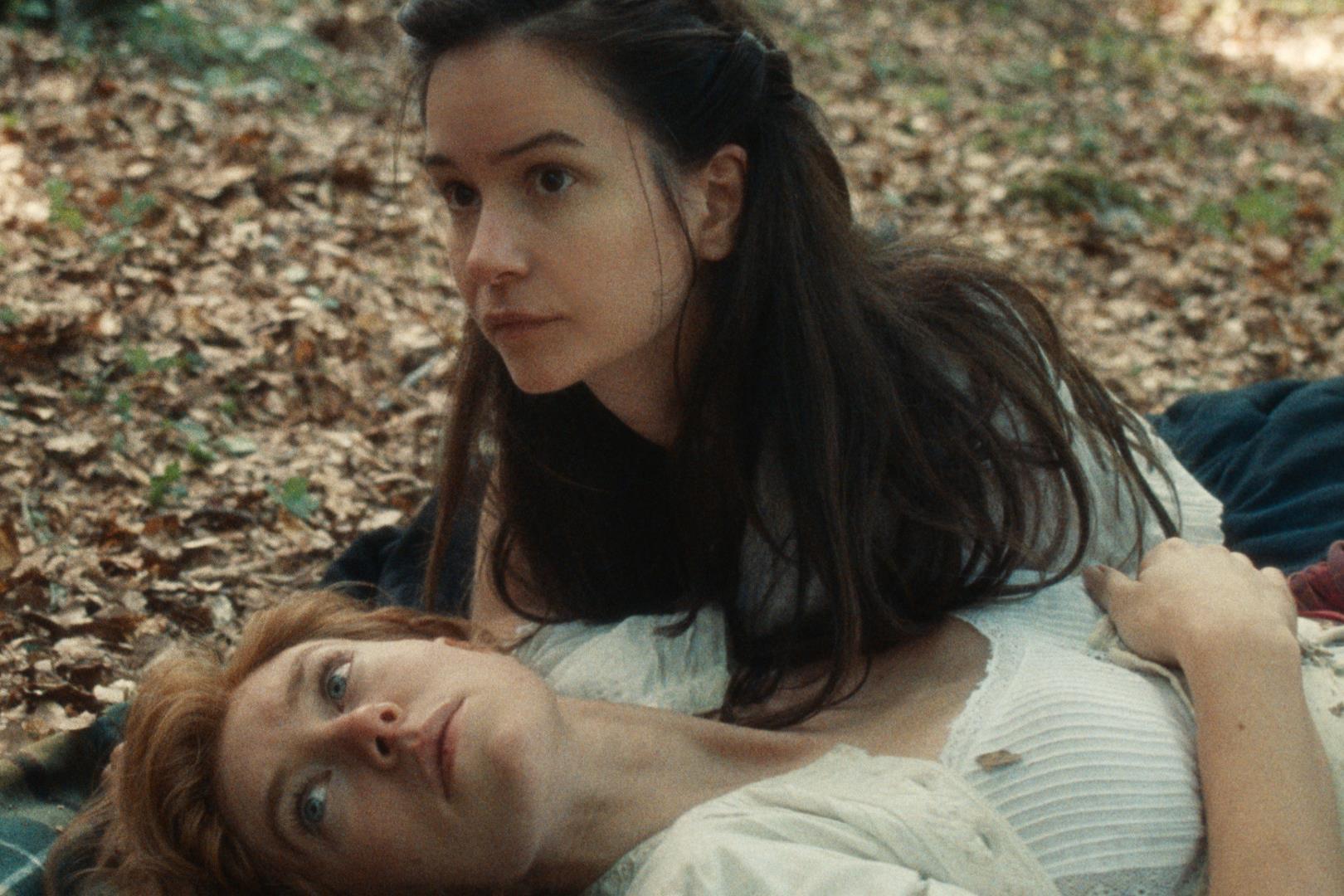
Variety
Работа двух далеких от кино литераторов привела к ожидаемой сценарной катастрофе: фильм напичкан литературными приемами — лубочным психологизмом, функциональной сменой времен года, как бы отражающей внутреннее состояние героини, и эпистолярными закадровыми монологами. Когда с экрана звучат невразумительные фразы, вроде «я превращаюсь в собственное горе», жди беды. Она приходит в формате нарушающего пасторальную динамику детективного саспенса и нелепого финального твиста, после которого начинает казаться, что из фильма вырезали полчаса экранного времени.

Venice Film Festival
Законы жанра не изменить — исторические мелодрамы о невозможной любви двух героинь в патриархальном обществе редко заканчиваются хэппи-эндом. Грустный финал всегда маячит где-то на горизонте, поэтому в том же «Портрете» большая часть фильма посвящена медленно развивающимся отношениям героинь, которые понимают, что их ждет, но предпочитают жить здесь и сейчас, наслаждаясь каждой проведенной вместе минутой. Шепарда и Хансена интересуют преграды этих отношений — то у одной муж придет домой раньше времени, то у другой начнет что-то подозревать и отправит под домашний арест. Самим отношениям достается мало экранного времени — создатели слишком рано разлучают героинь, не давая зрителям возможности по-настоящему проникнуться их историей.
Лерче всеми силами пытается оживить это мертворожденное кино своим взглядом — фокусирует внимание зрителя на уязвимости героинь, показывает, как им тяжело живется в мужском обществе, и документирует их повседневные обязанности. Тем временем Уотерсон и Кирби играют лучшие роли в карьере — живо смущаются, отводят взгляд и нелепо дотрагиваются друг друга, страстно целуются и меланхолично грустят. Жаль, что это ничего не меняет: парадоксальным образом в памяти «Мир грядущий» отпечатывается как история о двух разных мужьях, один из которых повернулся спиной к общественным ожиданиям.
«Муж простудился и я сделала ему клизму из патоки, жира и тёплой воды». Женская версия «Горбатой горы» 🏳️🌈. Когда фермеры беззаботно пасли овечек, чем занимались их жёны? А мог быть неплохой фильм про дружбу, если бы не пошёл по «розовой» дорожке.
Актёрский состав.
Кэтрин Уотерстон здесь в главной роли. Актриса мне не особо нравится. Если в «Фантастических тварях» я её с первого раза даже не запомнила(там всё внимание перетягивал на себя Эдди Рэдмейн). То в «Третьем дне» она реально выбесила, где сначала пускалась во все тяжкие как прожжённая развратница, а когда начинался «разбор полётов», она со страдальческим видом делала виноватыми всех кроме себя.
От Ванессы Кирби я тоже не в восторге. Помню её в какой-то из серий про «Пуаро», там она вроде бы и ничего. Но вот в экранизации «Больших надежд» Ч. Диккенса складывалось впечатление, что девушка была не совсем в курсе про какую эпоху речь.
Кейси Аффлек(«И грянул гром», «Он тебя не отпустит» и т.д.) как всегда в своём сдержанном в плане эмоций, но приятном амплуа. Это уже второй фильм, в котором жена попрекает его персонажа в чёрствости и безразличии.
Кристофер Эббот совсем не знаком по другим проектам, но внешне уж очень напомнил Кита Харингтона. Вообще, его персонажа не слишком часто показывали. Но он если честно, как-то слабо он похож на злюку и деспота, которым его хотели показать.
Откуда такое название?
Саундтрек.
То издалека доносятся звуки губной гармошки, то раздаётся гул гобоя или тромбона. Музыка монотонная и немного гнетущая, обычно такую используют в фильмах, дабы объяснить, что действие разворачивается на севере. Всё это периодически перемежается с уканьем совы, карканьем ворон и визгом поросёнка. Очень атмосферный фон. Но в какой-то момент или показалось, или в этот стройный ряд каким-то боком пытался примазаться саксофон.
Природные локации.
Вывод: фильм очень атмосферный, оператор отлично потрудился, такие таинственные природные локации и ракурсы интересные. Костюмеры постарались с одеждой, хоть и нет дорогих платьев, но всё детально продумано, можно сказать, с любовью. Да и актёрский состав довольно хорош. Тут нареканий нет, зато много претензий к сюжету. Та тема, которую хотели затронуть авторы, как-то неестественно запхнута в весь этот милый антураж. А приведённые факты не вызвали эмоций и не сподвигли сопереживать. В общем, хотели донести одну идею, но фильм, наоборот, заставил задуматься совершенно о другом.
The World to Come
2020, Romance/Drama, 1h 38m
What to know
critics consensus
The World to Come is made from ingredients that will be familiar to fans of period forbidden romance movies, but they’re given fresh life thanks to an excellent cast. Read critic reviews
You might also like
Where to watch
Rate And Review
Rate this movie
Oof, that was Rotten.
Meh, it passed the time.
It’s good – I’d recommend it.
So Fresh: Absolute Must See!
What did you think of the movie? (optional)
You’re almost there! Just confirm how you got your ticket.
How did you buy your ticket?
Let’s get your review verified.
AMCTheatres.com or AMC App New
Cinemark Coming Soon
We won’t be able to verify your ticket today, but it’s great to know for the future.
Regal Coming Soon
We won’t be able to verify your ticket today, but it’s great to know for the future.
Theater box office or somewhere else
By opting to have your ticket verified for this movie, you are allowing us to check the email address associated with your Rotten Tomatoes account against an email address associated with a Fandango ticket purchase for the same movie.
You’re almost there! Just confirm how you got your ticket.
Rate this movie
Oof, that was Rotten.
Meh, it passed the time.
It’s good – I’d recommend it.
So Fresh: Absolute Must See!
What did you think of the movie? (optional)
How did you buy your ticket?
AMCTheatres.com or AMC App New
Cinemark Coming Soon
We won’t be able to verify your ticket today, but it’s great to know for the future.
Regal Coming Soon
We won’t be able to verify your ticket today, but it’s great to know for the future.
Theater box office or somewhere else
By opting to have your ticket verified for this movie, you are allowing us to check the email address associated with your Rotten Tomatoes account against an email address associated with a Fandango ticket purchase for the same movie.
You haven’t finished your review yet, want to submit as-is?
You can always edit your review after.
Are you sure?
Verified reviews are considered more trustworthy by fellow moviegoers.
Want to submit changes to your review before closing?
Done Already? A few more words can help others decide if it’s worth watching
They won’t be able to see your review if you only submit your rating.
Done Already? A few more words can help others decide if it’s worth watching
They won’t be able to see your review if you only submit your rating.
The image is an example of a ticket confirmation email that AMC sent you when you purchased your ticket. Your Ticket Confirmation # is located under the header in your email that reads «Your Ticket Reservation Details». Just below that it reads «Ticket Confirmation#:» followed by a 10-digit number. This 10-digit number is your confirmation number.
Your AMC Ticket Confirmation# can be found in your order confirmation email.
Letterboxd — Your life in film
Where to watch
The World to Come
Synopsis
In 1856, two women forge a close connection despite their isolation on the American frontier.
Director
Producers
Writers
Editor
Cinematography
Production Design
Art Direction
Set Decoration
Composer
Sound
Costumes
Make-Up
Studios
Countries
Language
Alternative Titles
未来世界, Il mondo che verra’, Il mondo che verrá
Genres
Themes
105 mins More at IMDb TMDb Report this film
Popular reviews
SUNDANCE 2021: film #33
“there is something going on between us that i cannot unravel”
oh lord. this is poetic in a way but also reads like a horror movie. the chemistry between katherine and vanessa is real but it rarely gets a chance to shine, most of the narrative focuses on how sad and mundane daily life is and what a bummer it is that their lame husbands drag them down. it is what it is but just doesn’t work for me as a complete story, and with an ending just as bleak it might have made me cry but i also felt no desire to ever watch this in full again. i’m a little tired of sorrow
pioneer lesbians be like, «you smell like biscuit»
I just want Vanessa Kirby to talk to me in her American accent
the way the whole theatre (of lesbians) recoiled when the words «produced by casey affleck» came up on screen
Why yes, in fact, I can see how Vanessa Kirby moving in next door might distract one from one’s marital obligations.
everything about this is just divine! so beautifully restrained and yet i felt everything. loved katherine waterston’s very extra metaphors and christopher abbott doing nothing but looking hot. daniel blumberg’s score will inevitably make an appearance on my spotify wrapped. astonishment! and! joy!
every line spoken by vanessa & katherine sounds so poetic and then it comes time for christopher abbott to read one of their letters and he sounds like the boy from your english class that was half asleep and the teacher called on him to read aloud the next page of a book. i mean this as a compliment. it was a choice and i respect it.
vanessa kirby’s jaw acting.
this is everything «ammonite» tried to be and failed at. love vanessa kirby and i love this cinematography even more!
I watched this for the plot (gay Vanessa Kirby)
As coldly drawn as an atlas yet no less capable of enflaming the imagination, Mona Fastvold’s “The World to Come” is a hard and brittle period love story that thaws into something much warmer — what its hyper-literate heroine would call “astonishment and joy” — as a merciless 19th century winter blushes into a most unexpected spring. Tuesday, January 1st, 1856. Abigail (Katherine Waterston) mourns the daughter who was taken by diphtheria a few months prior, and journals about a world that feels barren in the young girl’s absence. “This morning, ice in our bedroom for the first time all winter,” she reads aloud in voiceover, offering the first excerpt from an interior monologue so pronounced that Fastvold’s romance often…
i don’t even know what to say, this has absolutely floored me. you truly feel everything here, from the coldest chills of the icy winters to the delightful warmth of the emerging spring. everything comes together and is carried along so perfectly by its astonishing performances and soundtrack. the score manages to capture every ounce of feeling and does everything that a score should do in such a simple yet phenomenal way. i love how the story weaves its way through time and dances between the seasons so poetically, with each new chapter lingering or passing by fleetingly in tune with the heart and soul of its protagonist. there’s such a timeless feel to this film, one that is both devastating and beautiful. it’s delicate and tender and will stay with me for times to come.
“You are my city of joy. You are my city of joy.”
the world to come
1 the world to come
2 De civitate Dei (The City of God, a book by St. Augustine that offered a comprehensive view of past history, the present, and the world to come in the light of scriptural revelation)
3 come up the world
He had grown into an extremely clear-headed, cautious, prudent young man, who was safe to rise in the world. (Ch. Dickens, ‘Hard Times’, book II, ch. I) — Из Битуэра получился на редкость рассудительный, осторожный, благоразумный молодой человек, которому был обеспечен успех в жизни.
Yes, Willis is no fool; he’ll get on in the world. (J. Lindsay, ‘All on the Never-Never’, ch. 22) — Да, Уиллис не дурак, он сделает карьеру.
4 come down in the world
5 come down in the world
Like many other families round there, they had come down in the world. (J. B. Priestley, ‘They Walk in the City’, ch. II) — Подобно многим здешним родам, Филдинги под конец пришли в упадок.
He admitted to himself that the district had come down in the world since those days when carriages had spun to the yellow-painted porticoes. (A. J. Cronin, ‘The Citadel’, book IV, ch. 1) — Эндрю пришлось признать, что квартал этот довольно-таки сильно обветшал с тех давних дней, когда к его желтым портикам подкатывали кареты.
6 come down in the world
7 come down in the world
8 come into the world
to bring into the world — произвести на свет, родить
to come into the world — появиться на свет, родиться
9 come (get or go) up in the world
10 come into the world
He died. six months before I came into the world. (Ch. Dickens, ‘David Copperfield’, ch. I) — Отец умер. за шесть месяцев до моего появления на свет.
The fat man: «Naked I came into the world and naked I will go out of the world. The banks will have my clothes.» (I. Shaw, ‘The Gentle People’, act III) — Толстяк: «Голым я появился на свет, голым и уйду из него, а банкирам достанется моя одежда.»
This little treatise came into the world last year. — Этот небольшой трактат увидел свет в прошлом году.
11 come up in the world
looking glass world — мир, где всё наоборот, странный мир
rise in the world — сделать карьеру; преуспеть в жизни
the world of spirit — духовный мир, духовная жизнь
12 come into the world
13 come up in the world
He has really come up in the world — he now owns a yacht.
14 come into the world
15 the world, the flesh, and the devil
16 come into the world
17 come up in the world
18 come up in the world
19 come down in the world
20 come into the world
См. также в других словарях:
The Life of the World to Come — infobox Book | name = The Life of the World to Come title orig = translator = image caption = 1st edition cover author = Kage Baker illustrator = cover artist = Paul Youll country = United States language = English series = The Company genre =… … Wikipedia
The Harder They Come — Infobox Film name = The Harder They Come director = Perry Henzell writer = Perry Henzell Trevor D. Rhone starring = Jimmy Cliff producer = distributor = released = flagicon|Italy 1972 (premiere at Venice Film Festival) flagicon|USA February 8,… … Wikipedia
The DEY Has Come EP — Infobox Album | Name = The DEY Has Come EP Type = EP Artist = The D.E.Y. Released = November 6, 2007 Recorded = 2006 2007 Genre = Pop, Hip Hop Length = Label = Epic / Koch Producer = J. R. Rotem Last album = This album = The DEY Has Come EP… … Wikipedia
The DEY Has Come — Infobox Album Name = Fearless Type = studio Artist = The D.E.Y. Released = Start date|2008|11|11 Recorded = 2008 Genre = R B, Soul Length = 47:43 Producer = Label = Epic, Sony BMG Last album = N/A This album = The D.E.Y. Has Come (2008) Next… … Wikipedia
come down in the world —
come down in the world —
The World of Kong — The World of Kong: A Natural History of Skull Island is a 2005 encyclopedic book, made for the release of Peter Jackson s King Kong. The book tells all about King Kong s fictional world. It talks about everything on Skull Island, from the… … Wikipedia
The Light of the World (Sullivan) — The Light of the World is an oratorio composed in 1873 by Arthur Sullivan. Sullivan wrote the libretto with the assistance of George Grove, based on the New Testament. The story of the oratorio narrates the whole life of Christ, focusing on his… … Wikipedia
The world is too much with us — is a sonnet by the English Romantic poet William Wordsworth. In it, Wordsworth criticizes the modern world for being absorbed in materialism and distancing itself from nature. Composed circa 1802, the poem was first published in Poems, In Two… … Wikipedia
The Best Dance Album in the World. Ever! — is a long running compilation series released by Circa Records, as part of the The Best. Album in the World. Ever! brand.TracklistingPart 1 (1993)VTDCD 17Disc 1#Black Box Ride On Time #2 Unlimited No Limit #Haddaway What is Love #Dr. Alban It… … Wikipedia
The world to come


ALSO BY JIM SHEPARD
The Book of Aron
You Think That’s Bad: Stories
Like You’d Understand, Anyway: Stories
Love and Hydrogen: New and Selected Stories
Batting Against Castro: Stories
Kiss of the Wolf
Lights Out in the Reptile House
You’ve Got to Read This (with Ron Hansen)
Unleashed: Poems by Writers’ Dogs (with Amy Hempel)
Writers at the Movies
THIS IS A BORZOI BOOK PUBLISHED BY ALFRED A. KNOPF
Copyright © 2017 by Jim Shepard
All rights reserved. Published in the United States by Alfred A. Knopf, a division of Penguin Random House LLC, New York, and distributed in Canada by Random House of Canada, a division of Penguin Random House Canada Limited, Toronto.
Knopf, Borzoi Books, and the colophon are registered trademarks of Penguin Random House LLC.
Several stories were previously published in the following publications:
Electric Literature: “Safety Tips for Living Alone”; One Story: “The World to Come”; McSweeney’s: “The Ocean of Air”; Tin House: “Positive Train Control,” “Wall-to-Wall Counseling”; Zoetrope: “Cretan Love Song,” “HMS Terror,” “Telemachus”
Library of Congress Cataloging-in-Publication Data
Names: Shepard, Jim, author.
Title: The world to come : stories / by Jim Shepard.
Description: First Edition. | New York : Alfred A. Knopf, 2017.
Identifiers: LCCN 2016038353 (print) | LCCN 2016044230 (ebook) | ISBN 9781524731809 (hardback) | ISBN 9781524731816 (ebook)
Subjects: | BISAC: FICTION / Short Stories (single author). | FICTION / Literary. | FICTION / Family Life.
Classification: LCC PS3569.H39384 A6 2017 (print) | LCC PS3569.H39384 (ebook) | DDC 813/.54—dc23
LC record available at https://lccn.loc.gov/2016038353
Ebook ISBN 9781524731816
This is a work of fiction. Names, characters, places, and incidents either are the product of the author’s imagination or are used fictitiously. Any resemblance to actual persons, living or dead, events, or locales is entirely coincidental.
Cover photograph by Orietta Corradi / EyeEm / Getty Images
Cover design by Kelly Blair
Also by Jim Shepard
Safety Tips for Living Alone
Cretan Love Song
The World to Come
The Ocean of Air
Positive Train Control
Forcing Joy on Young People
A Note About the Author
For Karen, yet again—
Safety Tips for Living Alone
Twenty-five years before Texas Tower no. 4 became one of the Air Force’s most unlikely achievements and most lethal peacetime disasters, marooning nineteen wives including Ellie Phelan, Betty Bakke, Edna Kovarick, and Jeannette Laino in their own little stewpots of grief and recrimination, the six-year-old Ellie thought of herself as forever stuck in Kansas: someone who would probably never see Chicago, never mind the Atlantic Ocean. Her grandfather wore his old brown duster whatever the weather, and when riding in her father’s convertible he always insisted on sitting in the dead center of the backseat with a hand on each side of the top to maintain the car’s balance on the road. This was back when the Army was running the Civilian Conservation Corps, the Navy exploring the Pole with Admiral Byrd, and the Air Corps still flying the mail in open-cockpit biplanes. Gordon had reminded Ellie of her grandfather, and this had stirred her up and set her teeth on edge. She’d first noticed him when he’d stood on the Ferris wheel before the ride had begun, to make certain another family’s toddlers had been adequately strapped in, and when they were introduced she’d said, “Who made you the Ferris wheel monitor?” And then after he’d answered with a grin, “Isn’t it amazing how much guys like me pretend we know what we’re doing?” she’d been shocked by how exhilarating it was to catch a glimpse of someone who saw the world exactly as she did.
She’d always been moved and appalled by the confidence that men like her grandfather and Gordon projected when it came to getting a handle on their situations. But they each also had a way of responding to her as if she’d come around to the advantages of their caretaking, and she surprised herself by not saying no when after a few months of dating he asked her to marry him. That night she stood in her parents’ room in the dark, annoyed at her turmoil, and then switched on their bedside lamp and told them the news. And when they reacted with some of the same dismay she was feeling, she found herself more instead of less resolved to go ahead with the thing.
Her father had pointed out that as a service wife she might see exotic places and her share of excitement, but she’d also never be able to put down roots or buy a house, and year after year she’d get settled in one place and then have to disrupt her life and move to another. Her children would be dragged from school to school. Her husband would never earn what he could as a civilian. And most of all, the Air Force would always come first, and if that seemed too hard for her, then she’d better back out now.
When her mother came into her bedroom a few nights later and asked if she really understood what she was getting herself into, Ellie said that she did. And when her mother scoffed at the idea that her Ellie would ever know why she did anything, Ellie said, “At least I understand that about myself,” and her mother answered, “Well, what does that mean?” and Ellie said she didn’t want to talk about it anymore.
“Now that we see you’re not going to change your mind, we give up,” her father announced a few days later, and she chose not to respond to that, either. His final word on the subject was that he hoped this Gordon realized just how selfish she could be. She lived with her parents for two more months before the wedding and they exchanged maybe ten words in total. Her mother’s mother came for a visit and didn’t congratulate Ellie on her news but did mention that the military was no place for a woman because the men drank too much and their wives had to raise their children in the unhealthiest climates. She offered as an example the Philippines, that sinkhole of malaria and vice.
They were married by a justice of the peace in Gordon’s childhood home in Pasadena, and her parents came all the way out for the ceremony and left before the reception, their wedding present a card that read, “Take care and all best wishes, Mom.” The following week Gordon was posted to a base in upstate New York and Ellie spent a baffled month alone with his parents before taking the Air Force Wives’ Special across the country: Los Angeles to Boston for one hundred and forty dollars, with stops everywhere from Fresno to Providence and seats as hard as benches and twenty infants and children in her compartment alone. The women traveling solo helped out the most overwhelmed mothers, and Ellie spent the trip crawling under seats to retrieve crayons and shushing babies whose bottles were never the right temperature.
In upstate New York, the place Gordon found for her while they waited for quarters on the base was a rooming house that instead of fire escapes had ropes coiled beneath the bedroom windows. She had only a room to herself, with kitchen privileges. “At least it’s quiet,” he told her when he first saw it, and then asked a few days later if her nightly headaches were related to what he’d said about her room.
She was relieved that he mostly served his time on the base. Larry was born, and Gordon worked his way up to captain, and when in 1957 he was offered the command of some kind of new offshore platform, he wanted to request another assignment—what Air Force officer wanted to squat in a box over the ocean?—but told Ellie that it was her decision, too. “You have a family now,” she answered. “I just want anything that keeps you closer.” “I wouldn’t get home any more often,” he pointed out. “And safer,” she added. So after sleeping on it, he told her he’d take the command, though afterward he was so disappointed that he wasn’t himself for weeks.
By 1950 the Department of Defense had determined that the radar arrays carried on Navy picket ships and Air Force aircraft on station were not powerful enough to detect incoming Russian bombers sufficiently far offshore to enable fighter interception. The radar stations comprising the Distant Early Warning system across the far north of the continent provided some security in that direction, but given that nearly all of America’s highest-priority targets were situated inside its northeastern metropolitan corridor, protection from an attack across the Atlantic seemed both essential and entirely absent. In response, the Air Defense Command urgently ordered the construction of five platforms along the coast from Bangor to Atlantic City. The platforms were called Texas Towers because of their resemblance to oil rigs, were numbered from north to south, and cost eleven million dollars apiece.
They faced engineering problems as unprecedented as the space program’s. Tower no. 4 in particular had presented a much greater challenge than the others since its footings would stand in 185 feet of water, more than three times as deep as the others. In 1955 the maximum depth at which anyone had built an undersea structure was sixty feet, and that had been in the Gulf of Mexico. Because of that, the Air Force had decided that this tower would require bold new thinking in its conception and hired a firm known for bridge design. The firm had had no experience at all in the area of ocean engineering for marine structures.
Tower no. 4 stood on three hollow legs nearly three hundred feet long. The legs were only twelve feet in diameter and braced by three submarine tiers of thirty-inch steel struts, and topped with a triangular triple-leveled platform that stood seventy feet above the waves. From its concrete footings on the seafloor to the top of its radomes it was the equivalent of a thirty-story building out in the ocean.
Though oil-drilling platforms had for the most part weathered the storms and seas of the Gulf, the Gulf at its worst was nothing like the North Atlantic.
And something was already wrong with Tower no. 4. Unlike the others, it moved so much in heavy weather or even a good strong wind that everyone who worked on it called it Old Shaky or the Tiltin’ Hilton.
The first time Gordon set foot on it he’d stood at the edge of the platform hanging on to the rope railings designed to catch those blown off their feet by wind gusts or prop wash, looked down into the waves so far below, and then out at the horizon, empty in all directions, and asked the officer he was relieving, “What the hell am I doing here?”
The tower housed seventy men. Besides crew and officer quarters and work stations it had a ward room, bakery, galley, mess, recreation area, and sick bay. Seven locomotive-sized diesel engines provided electricity, and on the lower level ionizing machines converted salt water to drinking water. Fuel was stored in the hollow legs.
The crew was half Air Force and half civilian welders and electricians and technicians. For every thirty days on you got thirty days off. The military guys liked it because they got more time than they were used to with their families, but the civilians hated the isolation and complained they were always away for the big holidays, everybody seeming to be stuck out on the platform for New Year’s and home for Groundhog Day.
But the tower shuddered and flexed so much in bad weather that whoever had painted “Old Shaky” over the door in the mess hall hadn’t even been able to get the letters straight, and the floors moved so visibly in the winter that everyone was too seasick to eat. In his first phone call, Gordon told Ellie that the medic who’d flown out with him hadn’t even served out his first day; that when he saw how much the platform was pitching he refused to get off the helicopter and took it right back to shore on the next flight out. Once he left, Gordon found a crow hunkered down on the edge of the helipad, its tail feathers pummeled back in the wind. They got blown out here sometimes, the captain he was relieving had explained. Gordon boxed the crow up and carried it to his stateroom and made sure it was ferried back on the last copter out that night. “Well, at least the crow is safe,” Ellie told him. “Unless he comes back,” her husband answered.
Betty Bakke’s husband, Roy, was a medic who hadn’t insisted on flying back to the mainland the first time he’d set foot on Tower no. 4, because he believed a man fulfilled his responsibilities. He’d already made master sergeant and been nicknamed for his standard advice, as in “I thought I was coming down with something but Don’t Sweat It said I was okay.” He’d transferred from the Navy, where he’d served on a minesweeper in Korea. The only thing that fazed him, he told Betty in his phone calls, was his separation from her. She and their boy were still stuck in their old bungalow in Mount Laguna on the other side of the country. Roy had put his friend and commanding officer, Gordon Phelan, on the phone during one call, and the captain had regaled her with stories about Roy. Roy had stayed on duty eighty straight hours with an airman second class who’d had a heart attack, and was even better known for having stitched up his own eyebrow after a fall while everyone else watched. He’d organized fishing contests off the deck and also radioed passing trawlers so the guys could trade their cigarettes and beer for fresh fish and lobster. On top of all of that, he’d taken charge of the 16mm movies swapped from tower to tower and had scored big that Thanksgiving by having dealt The Vikings with Kirk Douglas for The Sheriff of Fractured Jaw with Jayne Mansfield.
Betty had told the captain that her husband sounded like a one-man morale officer, and the captain said that was his point. And when Betty told him she’d heard that long separations were the reefs that sank military marriages, the captain had laughed and said he was going to pass the phone back to her husband. “Sounds like she needs a house call,” she heard him say to Roy.
The Navy Bureau of Yards and Docks had advised the engineers that Tower no. 4’s platform would need to withstand winds up to 125 miles per hour and breaking waves up to thirty-five feet, based on twenty years’ worth of data provided by the Woods Hole Oceanographic Institute. The main deck’s planned seventy-foot elevation should then provide plenty of clearance. A few members of the design team dissented, wishing to put on record their belief that wave heights and wind speeds should be calculated on the basis of what might be expected once a century rather than once every twenty years. They were outvoted.
To extend its radar coverage, Tower no. 4 had been given a location as close as possible to the edge of the continental shelf, which meant that just to its east the bottom dropped away thousands of feet and that waves coming from that direction or the north encountered that rising bottom and mounted themselves upward even higher. And in winter storms Tower no. 2, in much shallower water, had already recorded waves breaking over its deck.
But wait, Gordon told Ellie once he’d done a little more research: the news got even worse. Because the footings were so deep, no. 4’s hollow legs had been designed to be towed to their location, where they’d be upended and anchored to the caissons on the bottom before the main deck was attached and raised. But because the legs were so long, the designers had had to use pin connections—giant bolts—rather than welds in the underwater braces. Though bolts were an innovative modification, they failed to take into account the constant yet random motions of the sea. For that reason, oil rigs and the other towers had used welded connections. The moment the bolts had gone in, they began generati
ng impact stress around their connections. And Gordon had further discovered a storm had so pummeled two of the underwater braces during the towing that they’d sheared off and sunk during the upending, and that everyone had then floated around until the Air Force finally gave the order to improvise repairs at sea to avoid having to haul the entire structure back to shore.
Then, in heavy swells, the five-thousand-ton platform kept smashing up against the legs, so reinforced steel had been flown out and welded over the damage.
“Okay, I think it’s time to put in for a change of assignment,” Ellie told him in response. “Yeah, well, in for a penny, in for a pound,” he answered, by which she took him to mean, “You got me into this, so I don’t want to hear any complaints.”
As soon as the tower had gone operational, Wilbur Kovarick asked to be made its senior electrician so he could be closer to his family on Long Island, and Edna was so grateful that she kept him in bed the entire weekend.
By the time Edna had turned twenty-six, all but two of her friends had married and she’d been a bridesmaid five times. She told Wilbur on their first date that at the last wedding, if the clergyman had dropped dead at the altar, she could have taken over the service. He’d been sweet, and thought she was a riot, but after they said good night, she found herself back in her little rented room with no radio or television and her three pots of ivy, wishing she’d thought to get his home address or telephone number. By the time he called her she had no patience for pretense and told him to come right over, and when he appeared at her door she kissed him until he finally pulled away and she pressed her cheek to his and said, “I’m not fast, I just know what I want,” and after a moment he squeezed her even harder than she was squeezing him. Their first apartment after the wedding was so small that neither could get dressed in the bedroom unless the other stayed in bed, and Wilbur swore to do better as a provider and joined the Air Force so they’d send him to electricians school.
Мир грядущий, 2020
1850-е годы; умеренно Дикий Запад – штат Нью-Йорк, но до рождения Большого Яблока ещё далеко, вместо мегаполисов будущего – фермы и скромная сельская жизнь, которую ведут поселенцы. Среди них – Дайер (Кейси Аффлек, «Манчестер у моря») и его жена Эбигейл (Кэтрин Уотерстоун, «Война токов», «Фантастические твари»), тщательно фиксирующая повседневность в дневниковых записках; это её способ противостоять рутине. Такая же молодая семья – Финни (Кристофер Эббот, «Оно приходит ночью», «Пирсинг») и Талли (Ванесса Кирби, «Миссия невыполнима: Последствия», сериал «Корона») – поселяется на соседней ферме. Дружба между ровесницами возникает с первого взгляда – и быстро перерастает в нечто более глубокое и страстное, чем обычные приятельские отношения; нечто, что вызывает у мужчин ревность, зависть и гнев. Фильм, ставший событием 77-го Венецианского фестиваля, – вторая режиссёрская работа Моны Фаствольд, жены Брэди Корбета и соавтора его сенсационных фильмов «Детство лидера» и «Vox Lux». «Мир грядущий» – самостоятельная работа Фаствольд – крепкая эмоциональная драма, в которой, кроме умелой психологической нюансировки, есть – как в отношениях героинь – нечто большее: почти мистический взгляд на сложность и непредсказуемость человеческих характеров.
Мир грядущий (2020)
Как говорили герои «Горбатой горы»: «Мужская дружба — это больше, чем просто дружба». Фильм «Мир грядущий» ответит на вопрос «актуально ли тоже самое для дружбы женской». Фильм получил дату релиза и выйдет в прокат в феврале, после чего довольно быстро станет доступен на цифровых сервисах.
О чем картина «Мир грядущий»
Фильм перенесет зрителей в 1850 годы. Штат Нью-Йорк еще не стал центром мирового бизнеса и где-то в отдалении от центра города люди живут обычной фермерской жизнью, скучая в уединении. Так и живет супружеская пара Дайер и Эбигейл. Ранние подъемы, однотипные дни, которые сменяют темные и пустые ночи — тоска и скука. Чтобы хоть как-то скрасить свой досуг Эбигейл ведет записи в собственный дневничок, но и это скорее развлечение от безысходности.
Ситуация изменяется как только на соседнем участке селится еще одна молодая пара — Талли и Финни. Девушки моментально находят общий язык и становятся подругами не разлей вода. Довольно быстро дружба перерастает в нечто большее, что вызывает крайне негативную реакцию у их мужей. Возможно ли девушкам быть счастливыми без упреков со стороны мужей и общества или счастье — понятие исключительно общественное?
Режиссер фильма — Норвежка Мона Фастволд, для нее это вторая режиссерская работа после фильма «Лунатик» 2014 года.
Картина «Мир грядущий» была отмечена специальным призом кинофестиваля в Венеции («Лев», как вы понимаете, был в «голубом»).
Вы привлекательны… Я чертовски привлекательна.. Так чего зря время терять?!
Актеры и роли
Дата релиза фильма «Мир грядущий»
Картина дебютировала во время кинофестиваля в Венеции в начале осени 2020, но до широкого проката фильм доберется только в феврале, а уже в марте он будет доступен и на иных цифровых сервисах для покупки.
Мир грядущий (The World to Come) 2020 скачать торрент
Описание
1850-е годы, штат Нью-Йорк. До рождения Большого Яблока ещё далеко, вместо мегаполисов будущего — фермы и скромная сельская жизнь, которую ведут поселенцы. Среди них — Дайер и его жена Эбигейл, которая тщательно фиксирует повседневность в дневнике, это её способ противостоять рутине. Такая же молодая семья — Финни и Талли — селятся на соседней ферме. Дружба между ровесницами возникает с первого взгляда и быстро перерастает в нечто более глубокое и страстное, чем обычные приятельские отношения. Нечто, что вызывает у мужчин ревность, зависть и гнев.
Мир грядущий смотреть трейлер
Скачать Мир грядущий через торрент в хорошем качестве
Видео: XviD, 1534 Кбит/с, 720×432
Аудио: Русский (AC3, 6 ch, 448 Кбит/с)
Доп. информация: Релиз dalemake
Перевод: Авторский (одноголосый закадровый) Юрий Немахов | Thx KinoPub
  |
Подробнее
Подробнее
HDRezka
Подробнее
Подробнее
HDRezka
Джим Шепард
Джима Шепарда
Дэвид Инохоса
Кейси Аффлек
Уитакер
Ладер Маргарет Байлу
СОДЕРЖАНИЕ
участок
В 1856 году в округе Шохари Эбигейл и Дайер живут изолированной жизнью в деревне, работая фермерами. Они оба опустошены недавней потерей их маленькой дочери Нелли.
Рядом с ними появляется новая, такая же бездетная пара. Эбигейл сразу очаровывает Талли, жена, и две женщины быстро и глубоко подружились. Эбигейл признается Талли, что ее брак с Дайером основан на практичности, а не на романтике, в то время как Талли показывает, что ее муж Финни может быть сварливым и властным.
На день рождения Эбигейл Талли покупает ей страстный атлас. Когда Талли возвращается домой с дня рождения, она попадает в шторм, который чуть не убивает ее. Ее муж забирает ее, чтобы восстановить силы, и когда она возвращается, наступает весна, и Талли возобновляет свои визиты к Эбигейл.
В конце концов Талли рассказывает Эбигейл, что она только мечтает быть с ней. Эбигейл чувствует то же самое и оба целуются. У них начинается половой акт. Дайер, которая становится все более эмоциональной после смерти ребенка, расстроена тем, что Эбигейл проводит с Талли. Муж Талли так же завидует часам, которые она проводит вдали от него.
В конце концов Финни приглашает Эбигейл и Дайер на ужин, где он неловко воспитывает их потерянного ребенка, и Абигейл замечает синяки на шее Талли. После этого Талли не приезжает в течение недели. В конце концов, Абигейл отправляется на ее поиски и обнаруживает, что ее арендованный дом пуст, остался только окровавленный платок. Хотя она подозревает проказницу, в конце концов она получает письмо от Талли, в котором сообщается, что она переехала в 85 миль.
Эбигейл настаивает на встрече с Талли, и Дайер неохотно соглашается. Однако к тому времени, когда они приезжают, Талли уже мертва, и Финни утверждает, что она от дифтерии.
Абигейл возвращается к своей жизни на ферме. Она и Дайер продолжают работать вместе, но становятся все более отчужденными в эмоциональном плане. Чтобы утешить себя, Эбигейл представляет, как однажды убьет Финни, и пытается представить, как Нелли и Талли утешают себя в загробной жизни.
Бросать
Производство
Основные фотосъемки начались в сентябре 2019 года.
Музыка
Выпускать
Критический прием
The world to come: The cycles of history
The left should not welcome the fantasy of decoupling. Neither climate change nor future pandemics stop at borders.
Bazookas, heart attacks and artificially induced comas. The war over the economics of the Covid-19 crisis has been fought in metaphors. The future will be too. Which ones should we expect? Which ones should we hope for?
The three decades after the fall of the Berlin Wall in 1989 were dominated by metaphors of frictionless movement: flows, scapes and webs. We were presented with a latticework of circuitry strewn across the Earth’s surface, constructed with great precision to line up consumer demand and supply.
This year another metaphor became inescapable: supply chains. And the chains were heavy. Fights over face masks, hand sanitiser, testing kits and rubber gloves revealed simmering conflicts over economic dependency, especially between the US and China.
The US-China trade wars of the past three years had pointed in two different directions: either towards a globalisation rebooted under the fist of American unilateralism, or a reduction in the volume of cross-border flows. Despite predictions from commentators and economists, the latter has not yet happened. As the Wall Street Journal pointed out, global trade contracted by 1 per cent in 2019 – but this still left it the second biggest year on record.
Is reality a hallucination? The neuroscientist Anil Seth thinks so
Everything you want to know about the US midterm elections
The lessons from Germany’s experiment with near-free rail travel
If the pandemic does provoke a reversal of globalisation, the metaphor primed to capture it is in the headlines of the financial press: “decoupling”. A battle cry for some, and a death knell for others, decoupling has come to mean the mutual disengagement of the US and Chinese economies and the “reshoring” of supply chains and manufacturing capacity to the US.
THANK YOU
Although the chief proponent of decoupling in the US is Peter Navarro, an economic adviser to Donald Trump, the idea is also preached by the US trade representative Robert Lighthizer. They seem to have popular support. A recent survey showed that nearly 60 per cent of Americans believe that the US should “withdraw manufacturing from China”, and more than half of US businesses based in China thought that decoupling was possible (an increase of 22 per cent from October 2019).
Content from our partners
How central is carbon capture to reaching net zero?
“I can start when I want and finish when I want”
How to create a responsible form of “buy now, pay later”
One of the low-key accomplishments of the Trump administration has been shifting the cross-party consensus on China from business partner to economic threat. The Democratic candidate Joe Biden has joined the anti-China chorus.
If decoupling becomes the new horizon for political common sense, it is worth asking about the origins of the term. Decoupling was first used widely after the last global financial crisis in 2008. Observers felt that the rising industrial economies of China and India were showing remarkable resilience even amid a US slowdown. They speculated (incorrectly as it turned out) that these countries, like train carriages, had successfully “decoupled” from the locomotive of the US economy and may be running under their own power.
The decoupling of the early 2000s was the vision of a multipolar world originating from the Global South. That vision has now been co-opted by the Global North. But visions of autarky are far-fetched. As prominent political scientists put it in Foreign Affairs in December, “it’s too late to decouple” without intolerable levels of disruption to people’s lives. The left should not welcome the fantasy of decoupling. Neither climate change nor future pandemics stop at borders no matter how high the tariff wall, while any kind of effective internationalism would be undermined by a zero-sum logic of competition.
Instead of seeing supply chains as bonds to be snapped, we should re-envision them as circuits of mutual dependence, testaments to our inability to opt out of the world. Rather than entertain the fantasy of self-sufficiency, which will only be used as a bludgeon to beat out better terms from competitors, we need to see supply chains as eco-socialists do, as strings of opportunities for transnational labour. Speaking at the World Social Forum in 2004, Marcos Arruda of the Brazilian Solidarity Economy Network offered his own metaphor: instead of supply chains, “solidarity chains”.
The last cycle of world history between 1989 and the present was based on sunny depictions of “unfettered markets” and win-win globalisation that flew in the face of the facts – and the facts won’t stop whatever narrative comes next. Without our own metaphors, we’ll be forced to live with the ones the nationalist right makes for us.
Read the rest of the “world to come” series here
This article appears in the 26 Aug 2020 issue of the New Statesman, The world after Covid
What’s the world come to
When everything’s going the way of the gun
What’s the world come to
If life is a shadow of what has been done
I want you to know
Don’t take it slow
Just come undone
And the sin will take hold
I can’t hold it back
It’s too much to ask
You know the way
You’re up to the task
But please don’t tell us same
What’s the world come to
When bullets are all that you can undestand
What’s the world come to
When all that I touch will leave blood on my hands
I want you to know
Don’t take it slow
Just come undone
And the sin will take hold
I can’t hold it back
It’s too much to ask
You know the way
You’re up to the task
But please don’t tell us same
What’s the world come to
What’s it all come to
Nothing to see through
It’s all been spoken
Shattered and broken
Give it to me
Don’t tell me
What’s the world come to
Во что превращается мир?
Я хочу, чтобы вы знали
Если вы не поспешите
Просто опустив руки
Грех овладеет вами
Я не могу сдержать его
Слишком много вопросов
Вы знаете способ
Как справиться с этим
Но, пожалуйста, не говорите нам, что нет
Во что превращается мир
Когда вы можете понять только язык пуль
Во что превращается мир
Когда всё, чего я касаюсь, оставляет кровь на моих руках
Я хочу, чтобы вы знали
Если вы не поспешите
Просто опустив руки
Грех овладеет вами
Я не могу сдержать его
Слишком много вопросов
Вы знаете способ
Как справиться с этим
Но, пожалуйста, не говорите нам, что нет
Во что превращается мир
Куда всё это катится
Уже не осталось ничего нового
Всё оговорено
Разрушено и сломано
Дайте мне хоть какую-то надежду
Не говорите мне
Во что превращается мир
User Reviews
The performances were beautiful though maybe a little too understated. The scenery was beautiful in many parts.
Beyond that this is every other lesbian period movie you’ve ever watched. Tragic circumstances, stolen moments, cruel husbands, little story, little dialogue, slow build up, and of course, the tragic finale.
It’s not that these films are bad, it’s that there is so many of the mildly entertaining, deeply depressing lesbian themed romances that you find yourself barely paying attention. You are tensed throughout awaiting the final blow: death of one of the main romantic pair. sometimes, especially more recently, you are spared death in favour of a more open ended finish or one of them simply accepting their miserable circumstances.
You are not spared death here, it is just as depressing as it is every other time you’ve seen it, and it is highly predictable given the plot. Katherine Waterston does play her heartbreak very well. I don’t normally add big spoilers like this but I know within gay media it’s sometimes better to know going into it that you are going to see your representation die, or at least end up painfully miserable.
I guess it’s worth a watch if you’re a glutton for punishment like me, but don’t expect it to set your world on fire.
On the surface this might seem to be a story about two repressed lesbians, but it is so much more than that. It is hard for us today to relate to how it was in the mid 1800s. A man married a woman so she could give him children, she could do daily chores, like milk the cow and feed the pigs and chickens. They had none of the conveniences we take for granted, any entertainment had to come from within.
This is a story spanning about the first nine months of the year 1856. Of two young couples, each working nearby farms. One had a 4-yr-old child that became sick and died. The other couple were unable to have children and the man blamed it on his wife.
So although each wife was attractive, capable, and smart the husbands came to be less and less happy with them. The two young wives found happiness being with each other, sharing thoughts and emotions they could not with their husbands. A way to bring some light into their dreary days.
Yes, when it was all done one might say they were lesbians. Or maybe they were just forced into an attraction and hidden relationship that was their only choice in this bleak existence. No matter it is a good movie and I prefer to look at it as making the best of your situation.
On DVD from my public library, my wife chose to skip.
«When the day is done, my mind turns to her and I think, why are we to be separated»
It’s the story of two neighbouring couples who battle hardship and isolation, witnessed by a splendid yet testing landscape, challenging them both physically and psychologically.
This is a love story brought on be the harshness of the environment they live in and the relationships they are stuck in.
This won’t be to everyone’s taste but enjoyed they pace of it and I totally believed in the characters.
The intentions and aesthetic aims of this are righteous and therein lies the problem.
The work is from a prose piece and it may be more successful in that medium, some of which was transferred in the overuse of the voice over narration.
As cinema it doesn’t gel despite the pleasant landscapes and settings. It is as Scorsese said of most American cinema, a book with some pictures, and the sources of that weakness are in the script and the direction.
Other problems manifest in the acting which is reactive and somewhat inert, but also as in the script, which is very anachronistic. The ideas and use of speech is more akin to the present than of the mid nineteenth century in rural America.
Films are not documentaries but it strains credibility to set a story in one time and impose, perhaps unwittingly, contemporary mores. That aspect implies the righteousness, and even smugness, of the work, and as something that is implied in the title of the film.
Perhaps read the original story instead.
Greetings again from the darkness. I’d be hard-pressed to name a movie that is more somber, front beginning to end, than this film from director Mona Fastvold (writer of VOX Lux, 2018) and co-writers Ron Hansen (THE ASSASSINATION OF JESSE JAMES BY THE COWARD ROBERT FORD, 2017) and Jim Shepard (based on his short story). Allowing only a few sparks of hope in the second act, the film’s ending finds us nearly as beaten down as the four main characters we’ve just watched.
Abigail’s emptiness and unrequited quest for meaning seem her destiny until the day that new arrivals rent the next farm over. As Finney (Christopher Abbott) guides the wagon by, Abigail and Tallie (Vanessa Kirby) lock eyes, signaling to them (and us) that life on the frontier is about to become more exciting than collecting that day’s eggs from the chicken coup. This moment arrives mere weeks after Abigail as narrator has informed us, «With little pride and less hope, we begin the new year.» And just like that, she has hope.
The two women begin to spend days together building a connection first borne from isolation and loneliness, and soon growing into a true relationship. Dyer deals with his wife’s affinity for the new girl with a nonchalance that masks his agitation. Finney, on the other hand, is a quietly simmering man of anger that wreaks of a violent nature just below the surface. These are combustible elements in a world where this type of relationship between women is simply not discussed or admitted.
The four lead performances are all terrific. The two men have less screen time and certainly less dialogue, but we never once doubt where they stand. Ms. Waterston has been a standout with her work over the past few years, and Ms. Kirby recently posted one of last year’s finest performances in PIECES OF A WOMAN. She’s clearly a star in the making. Composer Daniel Blumberg’s work is a good fit, and cinematographer Andre Chemetoff works wonders with the muted color palette. Bucharest is the stand in for 19th century upstate New York, allowing us to see the harshness. Period lesbian romances are rare, though this is the third in a short period of time along with AMMONITE (2020) and PORTRAIT OF A LADY ON FIRE (2019). Just prepare yourself for an hour and a half of anguish. In theaters February 12th, 2021 and on digital March 2nd, 2021
The World to Come
Get A Copy
Friend Reviews
Reader Q&A
Lists with This Book
Community Reviews
I have an interview with Jim forthcoming in Kirkus Review, but I’ll say here that this is yet another stellar book from a writer incapable of producing anything else. Shepard is a master of the form, and it’s never been more apparent than in the stories that comprise this collection; stories in which Shepard’s radical empathy, intellectual acuity, unremitting imagination, and sorcery over language are on full displa Edit: here’s my chat with Jim at Kirkus: https://www.kirkusreviews.com/feature.
I have an interview with Jim forthcoming in Kirkus Review, but I’ll say here that this is yet another stellar book from a writer incapable of producing anything else. Shepard is a master of the form, and it’s never been more apparent than in the stories that comprise this collection; stories in which Shepard’s radical empathy, intellectual acuity, unremitting imagination, and sorcery over language are on full display. He makes imprecision of thought, feeling, and description his enemy. He writes from a reservoir of rigorous care and concern. (Though he would and did rebuke this: He does what Saunders wishes he could do.)
Put simply, Jim is my favorite living male writer, and a hell of a human being to boot. Consider these passages, then go out and buy this collection in February:
“And in every room there were other versions of my sister and me. They gave me that look and they dragged their feet. Or they reached for my hand and then knocked it away. They saw right through me, but even so they kept perking up, like they’d never stopped thinking I was someone they should stay in contact with, or they’d never stopped believing I might be about to step in and make things better.”- «Wall-to-Wall Counseling
«In the interval you have left you might even make
clear with just a moment’s embrace and the time to hold her face still and engage her eyes that despite your lassitude and arrogance and petulance and selfishness and pettiness, she’s granted you a gift for which you’ve never adequately expressed your joy. She’s buoyed and nurtured you and weathered your despotism, and continued to envision what you could’ve become rather than what you are. She’s put wings to your feet for the entirety of your lives together, and with them you run.»- «Cretan Love Song»
This review has been hidden because it contains spoilers. To view it, click here. A short story collection. This is the kind of writer that makes you feel lazy. Not only is the writing stunningly good, but almost all (maybe all?) the stories were historical fiction that involved a lot of research, in a wide array of historical periods and locations. The style, voice, and range of characters makes it almost hard to believe this is all the same author.
There’s a 19th-century farm woman whose secret lesbian lover is killed by domestic violence (and her husband gets away with it), A short story collection. This is the kind of writer that makes you feel lazy. Not only is the writing stunningly good, but almost all (maybe all?) the stories were historical fiction that involved a lot of research, in a wide array of historical periods and locations. The style, voice, and range of characters makes it almost hard to believe this is all the same author.
There’s a 19th-century farm woman whose secret lesbian lover is killed by domestic violence (and her husband gets away with it), pioneers in Australia during a massive storm, an ancient Minoan husband and father who dies in a volcanic explosion, and a group of poor, doomed Air Force cadets killed by a rogue wave on Texas Tower 4, a radar surveillance station off the coast of New England (although really, they were killed by the careless, shoddy construction of the structure and the lack of prompt evacuation by our government).
«These ten stories burst with his wicked sense of humor and incomparable understanding of what it means, and has always meant, to be human. The World to Come is the work of a true virtuoso.»
I’d say that sets the bar pretty high.
The author indeed has a gift for giving his characters distinctive voic 3 stars. I was intrigued by Outside Magazine’s glowing review of Jim Shepard’s new short story collection, The World to Come The expectation of greatness was amplified by the book jacket description:
«These ten stories burst with his wicked sense of humor and incomparable understanding of what it means, and has always meant, to be human. The World to Come is the work of a true virtuoso.»
I’d say that sets the bar pretty high.
The author indeed has a gift for giving his characters distinctive voices. He’s captured period diction almost perfectly, from the dry «stiff upper lip» of British explorers to the pioneer diary of an upstate New York woman to the elaborate and stylized prose of the dying days of the French aristocracy. The author’s obvious talents are on display in a second-person story of the destruction of Santorini. Shepard’s settings are clearly exquisitely researched as well, rich with details that give authenticity to a WWII submarine and a crude oil train conductor’s experiences.
For all the writing skill, The World to Come was largely «meh» for me largely because I never made an emotional connection with the characters. Two of the stories are told in a journal format, which relate events instead of developing characters. Stories such as «The Ocean of Air» overwhelmed with detail to the exclusion of personality. «Intimacy» and «Safety Tips for Living Alone» presented a wide cast of characters but spent so little time with any one that they seemed largely interchangeable. «Wall-to-Wall Counseling», «Forcing Joy on Young People», «Telemachus», and «Positive Train Control» all featured detached characters who didn’t relate to those around them, and thus were never able to reach me.
My chief critique of Shepard’s writing is that there is very little dialog. This inhibits character relationships from developing. Most characters feel like the anti-Donne: every one is an island, and when the bell tolls for them, it doesn’t toll for me.
Many of the stories ended with the implied death of their subjects. This prevented me from experiencing closure and catharsis necessary to appreciate the theme of the story. The first-person narration of many of the stories limits this by nature; in others, they end with no conclusion.
I felt that my enjoyment of a particular story was largely tied in with my interest in its subject matter, which left the collection feeling uneven. The three-page «Cretan Love Song» was my favorite because it captures the raw emotions of the destruction of Santorini so poignantly. «Safety Tips for Living Alone» is an intriguing account of the Texas Tower 4 disaster; a foreboding sense of doom kept me turning the pages. «HMS Terror» is another high point. Its scholarly journal entries added to the classical tragedy feel of the lost Franklin expedition. Shepard’s masterful foreshadowing in «Positive Train Control» adds power to his scathing indictment of the lack of safety focus in the crude oil trains that feed our energy dependency. «Telemachus» reads like pulp WWII fiction with its fatalistic narrator and high-stakes deeds.
On the down side, «Wall-to-Wall Counseling» portrayal of a woman facing family and work crises ended without resolution, character development, or theme. Similarly, «Forcing Joy on Young People» meandered aimlessly here and there throughout its principal character’s life, and he was so flawed that the only conclusion I could reach is that he deserved what he got.
It’s rare to read a book of short stories where EVERY one knocks your socks off, but this was the case with Jim Shepard’s latest collection «The Word to Come.» Despite hearing rave reviews for Shepard’s short stories for years, I only recently discovered the author when I finally picked up his excellent novel «The Book of Aron» last year, and since then I’ve been curious to read more from him.
Keeping in line with his flair for engaging historical fiction, Shepard’s stories feature captivating s It’s rare to read a book of short stories where EVERY one knocks your socks off, but this was the case with Jim Shepard’s latest collection «The Word to Come.» Despite hearing rave reviews for Shepard’s short stories for years, I only recently discovered the author when I finally picked up his excellent novel «The Book of Aron» last year, and since then I’ve been curious to read more from him.
If you know Jim Shepard’s work, you’ll know the extent to which this story both true-to-form and a departure for him.
Jim Shepard can do anything on the page, I’m coming to If you know Jim Shepard’s work, you’ll know the extent to which this story both true-to-form and a departure for him.
I sought out this book because I so loved the screenplay for The World to Come, which Jim Shepard adapted with Ron Hansen from the title story in this collection. «I’m a library without books» may be the saddest sentence I have ever heard/read. At the same time, some of the diary entries are achingly beautiful descriptions of being in love. While this story is yet another tale of queer tragedy (and one written by a man), what this one has going for it is that neither woman is shown to be distres I sought out this book because I so loved the screenplay for The World to Come, which Jim Shepard adapted with Ron Hansen from the title story in this collection. «I’m a library without books» may be the saddest sentence I have ever heard/read. At the same time, some of the diary entries are achingly beautiful descriptions of being in love. While this story is yet another tale of queer tragedy (and one written by a man), what this one has going for it is that neither woman is shown to be distressed by her queerness.
Several other stories in the collection are based on historic and recent real-world tragedies, endeavours of human progress, and the disastrous force that is Nature — the Franklin Expedition, Texas Tower 4, life aboard a WWII submarine, the invention of the hot air balloon, and the Lac-Mégantic rail disaster. Despite mostly tragic conclusions to these stories, romantic and familial love, and the indomitable human spirit are woven through the collection. This, along with Shepard’s poetic language, cuts through the bleakness.
Who Needs Pay?
A hard day’s work deserves a fair day’s pay. A colloquialism held classically for managers, the United States economy holds this operating assumption. If the average person works hard, just compensation becomes the result. When the company prospers, the employees prosper at an equal rate of advancement. Classic motivational carrots and sticks implies that managers and employees alike hold shared interest in the flourishing of the company; everyone benefits. Even more, managers have Who Needs Pay?
A hard day’s work deserves a fair day’s pay. A colloquialism held classically for managers, the United States economy holds this operating assumption. If the average person works hard, just compensation becomes the result. When the company prospers, the employees prosper at an equal rate of advancement. Classic motivational carrots and sticks implies that managers and employees alike hold shared interest in the flourishing of the company; everyone benefits. Even more, managers have always found it in their best interest to pay people well. Happy employees are engaged employees. Turnover is expensive. And well-compensated employees buy things. People often associate the success of Ford’s Model T with Ford’s decision to pay his employees enough to buy the Model T.
Given this understanding, 2017 has placed a burden on my egalitarian and collectivist perspectives. Statistically, the once-lockstep association between productivity and compensation has shattered. While employees continue to work at a more efficient pace to produce more goods, wages are falling flat. The difference slips into the pockets of shareholders who, in turn, heap praise on executives and bump up the executive compensation packages. As a result, society leans plutocratic, where the majority of the resources funnel to the few and the masses are left scraping the bottom of the barrel for survival.
To Plutocracy!
It seems as if almost every institutional decision points toward this plutocratic existence, a place where the few can conduct a cocktail party while the world burns around them, like Mr. Robot recently depicted so apropos.
The classic understanding of economic flourishing would suggest plutocracy leads to societal demise. When the rest of the world can no longer afford to engage in the marketplace, civilization dies.
Within this understanding of how the world works, Jim Shepard’s The World to Come offers a collection of stories highlighting the many ways indifferent, plutocratic institutions grind down and spit out the people it relies upon to keep the lights on.
Texas Tower no. 4
In the opening story, Shepard depicts the real-life Air Force catastrophe of Texas Tower no. 4 through the framing device of phone calls home to spouses.
“’So they’ll just evacuate you until spring, then?’ Jeannette asked Louie once he’d shared the news on his leave. They’d been lying together, and Louie answered that he didn’t see what else the Air Force could do, given how badly no. 4 was damaged. And Jeannette startled him by shouting, ‘Don’t lie to me about this!’ and then rolling away. And after he’d driven back to base, she found under her pillow a note that read, ‘I love you SO much.’ It was paper-clipped to a booklet entitled SAFETY TIPS FOR LIVING ALONE” (21).
Death’s Public Relations
Shepard illustrates the deadening life of a PR worker in an insurance agency hellbent on denying coverage.
“He was talking about my Horror Stories inbox, which was so nuts by that point it took me a full five minutes to scroll though it. I work for the PR arm of America’s largest health insurance company, and the last few months the entire Eastern Seaboard had apparently been denied claims for reasons that would make any self-respecting media outlet sit up and take notice, and I was having trouble writing up the explanations as to why. Some of the clients, if you had any kind of heart, it wasn’t easy to explain why they should be shit out of luck” (37).
Positive Train Control
He also outlines how the profit motif overwhelms any moral faculty for human life in the freight train industry.
“All sorts of things could’ve made this work safer, and deregulation gutted every one of them. Going slower is always safer, but the speed limit for extremely hazardous materials got bumped up to forty miles an hour. In emergency stops, electronic braking systems can keep the cars from piling into one another, but the companies said they were too expensive. Shorter trains have a much lower chance of derailing, so our union asked for a 30-car limit, but most of the trains now haul 100 to 120. Pressure-relief valves on the tank cars reduce the risk of explosions but are only recommended, not required, by the National Transportation Safety Board. And with the track problems, better inspection would help, but here’s how big a job that is: even Amtrak, the runt of the litter, operates over twenty-two thousand miles of track” (165).
Each story, in its own way, announces the plutocratic foundations of society. Time and time again, the stories place the competing interests of human life and profit on a balance. And unfortunately, human life loses. The World to Come is a sobering look at institutional transgression. Not a light read. But recommended if you can stomach the darkness.
Normally, I do not read short stories. However, when I saw a review of the book (likely from Kirkus) and with the words of Colum McCann (in his weekly blogs from 2016) in mind, something like “read as much as you can, and as varied as you can”, I decided to try the book.
In any set of stories, it is likely you can find one you enjoy. But with this author, there were several that stayed with me well beyond the reading, even from the short number of pages. In one case “Wall-to-Wall Counseling” I be Normally, I do not read short stories. However, when I saw a review of the book (likely from Kirkus) and with the words of Colum McCann (in his weekly blogs from 2016) in mind, something like “read as much as you can, and as varied as you can”, I decided to try the book.
In any set of stories, it is likely you can find one you enjoy. But with this author, there were several that stayed with me well beyond the reading, even from the short number of pages. In one case “Wall-to-Wall Counseling” I began to wonder whether I lived such a sheltered life; I was completely baffled on how the protagonist managed in her daily chaos; if her life is normal (and I know some people a bit like her), then mine must not be. In another story, “Safety Tips for Living Alone”, it is clear early on that the story will not end well (in fact, in most of these stories it does not end well), yet the writing creates a web of invisible ties around you that pulls you along – you need to get to the end. Another, “The World to Come”, draws you in for and through the feeling of the protagonist; she lives in a very closed environment but for a while has a means of escape from the day to day and from the confines of her spirit. However, as with other stories in this collection it does not end well; however as the title of the story suggests, the protagonist imagines the world to come.
The shortest story, “Cretan Love Song”, is two and a half pages, and captures the thinking of one individual as he experiences the cataclysmic event (and it does not end well for him); the story ends with his final thoughts – ones about his wife and his thanks for her in his life.
I was wondering while I was reading these stories why I continued. None ended well (no happy endings). Yet when I got to the last one, “Intimacy”, I am glad I kept reading. The story takes place on the north eastern coast of Australia (Brisbane and north), first pulling on several threads of individuals and their lives, and then how they individually deal with the impact of a huge cyclone (it may have been talking about the storm of March 1899, called Mahina, see http://www.abc.net.au/news/2017-03-27. ). Of course, it does not end well in a broad sense, however most of the key individuals survive. I was struck by the writing about the storm and its impact; it is riveting. And by the end, through the storm and its aftermath, people realized their own priorities and inner strengths.
I have added some links to reviews of the book for those interested:
Review of The World to Come by Lisa Zeidner: https://www.washingtonpost.com/entert.
Finally, the writing did force me to go to the dictionary a few times, with some choices of words I had not encountered before.
Comment on Ratings (i.e., number of stars)
In this and the next few reviews I will be trying to establish some criteria for how I rate books. I note my ratings tend to be a bit higher than others (although not always). Why is that? Perhaps I am more selective? Perhaps I am in awe of anyone who can publish a story (or collection of stories) or the telling of a story (in the case of history, science, …)?
As a first thought, perhaps all books should start with a three (out of five) star rating. To earn another star, the story telling must be strong and convincing. To earn yet another star, the story needs to open up my thinking in ways it had not done before.
I am a Jim Shepard fan. I have attended two of his readings. For my critical essay in graduate school I analyzed his works and his overarching themes of the liminal space between being unable and unwilling to communicate with others; and how we don’t understand or disguise from ourselves our own true natures until faced with calamity and natural disaster. For this project, I interviewed him via email over the course of many months.
I am also a fan of the short story format.
However, for me, this I am a Jim Shepard fan. I have attended two of his readings. For my critical essay in graduate school I analyzed his works and his overarching themes of the liminal space between being unable and unwilling to communicate with others; and how we don’t understand or disguise from ourselves our own true natures until faced with calamity and natural disaster. For this project, I interviewed him via email over the course of many months.
I am also a fan of the short story format.
However, for me, this collection had more misses than hits. That’s not to say the misses weren’t failures: they just didn’t connect with me. There are two stories in particular in this volume where Shepard is trying something new: examining the affects of disaster on a group of individuals (as opposed to a group as a collective), instead of examining them on a specific person: the first story «Safety Tips for Living Alone,» and the last story «Intimacy.» This technique is stronger in the first piece, but because it’s exploring so many lives in such a small space, the affect of the disasters is diffuse. These two stories are ensemble films told in a short film format, where a lot of the film pores over the technical details of what it’s exploring.
These stories serve to demonstrate two of Jim Shepard’s great passions: chronicling historical disasters and conducting research. Eight of the ten stories fictionalize real disasters narrated by characters who could have confronted them. These stories also contain so much historical detail that they resemble investigative journalism. It is obvious that Shepard enjoys his time with original records (e.g., personal diaries, journals, naval histories, minutes of hearings, and even safety handbooks These stories serve to demonstrate two of Jim Shepard’s great passions: chronicling historical disasters and conducting research. Eight of the ten stories fictionalize real disasters narrated by characters who could have confronted them. These stories also contain so much historical detail that they resemble investigative journalism. It is obvious that Shepard enjoys his time with original records (e.g., personal diaries, journals, naval histories, minutes of hearings, and even safety handbooks intended for employees) and his interests are indeed broad (e.g., Arctic exploration, railway infrastructure, submarine warfare, tsunamis, ocean towers, early flight, volcanic eruptions). Yet there are a few unifying themes in this collection, most notably that man is at the mercy of fate and powerful environmental forces.
The title story is an outlier because it tells a subtler story of two isolated farm wives whose loveless marriages push them into a close relationship. Because of its psychological and personal focuses as opposed to the more dramatic fare of the other stories, this one probably is the strongest piece in the collection.
“Safety Tips for Living Alone” is the most dramatic story. It tells of a collapsing Air Force radar platform in the North Atlantic from the dual perspectives of its commander who is facing a devastating storm and his wife who monitors everything from home.
Although they are set in the past, most of the stories resonate with similar problems we still face. “Positive Train Control” raises the specter if our failing infrastructure. “Cretan Love Song” reminds us of the unpredictability and destructive power of tsunamis. «HMS Terror» tells the story of what can go wrong with exploration.
The first person narratives simultaneously immerse the reader in the drama of dire situations while evoking much of the minutia of daily life. If there is one flaw with Shepard’s writing, it may be his attraction to minutia, an approach that tends to occasionally detract from the tension that he carefully build in the stories.
. more
The last paragraph of the first short story packed a real wallop:
«What the Senate report spared them was the last thing their husbands had seen that night while they slewed across the pitching and ice-covered platform in the rain and sleet and wind in their survival suits, waiting for their rescue. While Jeannette and Edna and Betty and Ellie had sat by their phones castigating themselves for ever having entrusted their lives to other people’s promises, off to the southeast of their husbands’ pl The last paragraph of the first short story packed a real wallop:
«What the Senate report spared them was the last thing their husbands had seen that night while they slewed across the pitching and ice-covered platform in the rain and sleet and wind in their survival suits, waiting for their rescue. While Jeannette and Edna and Betty and Ellie had sat by their phones castigating themselves for ever having entrusted their lives to other people’s promises, off to the southeast of their husbands’ platform as if in a silent movie the sea was rising, and one after another their husbands had turned in that direction, confused that everything was black until they realized they weren’t seeing any crests or spray because they weren’t looking at the thin white edge of the top of the wave. And they recognized if as the implacability that would no longer indulge their mistakes and would sweep from them all they had ever loved.»
Whoo boy. That’s some deep, soul-shaking writing.
Every single story in this collection of historical fiction and contemporary fiction pieces is breathtaking, full of incredible and often all-too-real details, and features characters (whether based on real people or not) that leap off the page. I particularly appreciate how writer Jim Shepard finds the humanity and depth in characters that are otherwise difficult to like.
The title story is a gorgeous examination of a forbidden love that simply cannot survive in its era. It’s a great story, but Every single story in this collection of historical fiction and contemporary fiction pieces is breathtaking, full of incredible and often all-too-real details, and features characters (whether based on real people or not) that leap off the page. I particularly appreciate how writer Jim Shepard finds the humanity and depth in characters that are otherwise difficult to like.
The title story is a gorgeous examination of a forbidden love that simply cannot survive in its era. It’s a great story, but one that is a little hard for me to take after the transcendence of Call Me By Your Name and that book (and movie’s) powerful rejection of the old tropes in LGBT fiction. Yet this book is very much about catastrophe, so «The World to Come» fits in well. I frequently found myself looking up information about the events Shepard writes about in his stories that sound so unbelievable but really did take place. The three stories set in modern times are perfectly placed breathers from history no less lacking in concrete details and relevant facts.
The world to come
Email not verified
TRY AGAIN CANCEL
Let’s keep in touch
Stay up-to-date on all the latest Rotten Tomatoes news! Tap «Sign me up» below to receive our weekly newsletter with updates on movies, TV shows, Rotten Tomatoes podcast and more.
Forgot your password
Please enter your email address and we will email you a new password.
The World to Come
The World to Come Reviews
Why are you flagging this review?
We encourage our community to report abusive content and/ or spam. Our team will review flagged items and determine whether or not they meet our community guidelines.
Please choose best explanation for why you are flagging this review.
Thank you for your submission. This post has been submitted for our review.
Sincerely, The Rotten Tomatoes Team
Something went wrong. Please try again later or contact our team. You may have already flagged this review for us and we are still processing your request.
Sincerely, The Rotten Tomatoes Team
Why are you flagging this review?
We encourage our community to report abusive content and/ or spam. Our team will review flagged items and determine whether or not they meet our community guidelines.
Please choose best explanation for why you are flagging this review.
Thank you for your submission. This post has been submitted for our review.
Sincerely, The Rotten Tomatoes Team
Something went wrong. Please try again later or contact our team. You may have already flagged this review for us and we are still processing your request.
Sincerely, The Rotten Tomatoes Team
must see. i am in awe. in love. i love love. i hate hate its just that good my heart still aches 6 months later
must see. i am in awe. in love. i love love. i hate hate its just that good my heart still aches 6 months later
Nicely done. A well told and interesting story. Unfortunately, a sad story.
Nicely done. A well told and interesting story. Unfortunately, a sad story.
Ele é perfeito, fiquei com depressão.
Ele é perfeito, fiquei com depressão.
Who am I just a dreamer. The beautiful sobbing love of the two main characters made me deeply moved. Classic background, mountains, forests, everything has a lonely natural look. Every day passed boringly until the day you appeared. Then it seems to be happiness, joy. What we bring to each other is excruciating pain, choking nostalgia.
Who am I just a dreamer. The beautiful sobbing love of the two main characters made me deeply moved. Classic background, mountains, forests, everything has a lonely natural look. Every day passed boringly until the day you appeared. Then it seems to be happiness, joy. What we bring to each other is excruciating pain, choking nostalgia.
[Spoilers ahead] The dialogue throughout most of the movie felt flat, but I did enjoy the relationship between Abigail and Tallie. Unfortunately it follows the long held LGBT movie standard that two women cannot live happily ever after together. Perhaps I’ve been spoiled too much by the endings hetero romances usually get, but when I watch a movie touted as a romance, I expect to be smiling at the end as the couple finally overcomes whatever obstacles were in their way and rides off into the sunset together. But this is yet another LGBT film that has left me feeling disappointed and depressed, and I sincerely regret wasting an hour and half of my life watching it.
[Spoilers ahead] The dialogue throughout most of the movie felt flat, but I did enjoy the relationship between Abigail and Tallie. Unfortunately it follows the long held LGBT movie standard that two women cannot live happily ever after together. Perhaps I’ve been spoiled too much by the endings hetero romances usually get, but when I watch a movie touted as a romance, I expect to be smiling at the end as the couple finally overcomes whatever obstacles were in their way and rides off into the sunset together. But this is yet another LGBT film that has left me feeling disappointed and depressed, and I sincerely regret wasting an hour and half of my life watching it.
The World to Come is a beautifully acted, very tender and moving period drama about finding love in a hostile environment. Set in 1856 in upstate New York the film tells the tale of two couples in an isolated farming community. Abigail and Dyer have recently lost their child and are feeling distraught and lonely. There is little love in their marriage. Finney and Tallie move in close by. Tallie confides in Abigail and they bond over their loneliness and lack of love. After months of hardship through harsh winters Tallie and Abigail begin a love affair. This is a quiet film but emotions burn deeply beneath. It’s a great portrayal of the strength of women in times that didn’t give them much respite. All four lead actors are stellar as expected. Katherine Waterston, Vanessa Kirby, Christopher Abbott and Casey Affleck are always a pleasure to watch. This small wonderful film is certainly worth your time.
The World to Come is a beautifully acted, very tender and moving period drama about finding love in a hostile environment. Set in 1856 in upstate New York the film tells the tale of two couples in an isolated farming community. Abigail and Dyer have recently lost their child and are feeling distraught and lonely. There is little love in their marriage. Finney and Tallie move in close by. Tallie confides in Abigail and they bond over their loneliness and lack of love. After months of hardship through harsh winters Tallie and Abigail begin a love affair. This is a quiet film but emotions burn deeply beneath. It’s a great portrayal of the strength of women in times that didn’t give them much respite. All four lead actors are stellar as expected. Katherine Waterston, Vanessa Kirby, Christopher Abbott and Casey Affleck are always a pleasure to watch. This small wonderful film is certainly worth your time.
Cute cottage core lesbians, edges period drama? Idk. great to watch but don’t have to watch again.
Cute cottage core lesbians, edges period drama? Idk. great to watch but don’t have to watch again.
I enjoyed the movie very much. Wonderful acting and lovely scenery.
I enjoyed the movie very much. Wonderful acting and lovely scenery.
Mopey af, but then Casey Affleck so as expected. Well acted, well shot, pacing was slow but suitable, not too overly dramatic, tells a sweet somewhat sad, poetic story
Mopey af, but then Casey Affleck so as expected. Well acted, well shot, pacing was slow but suitable, not too overly dramatic, tells a sweet somewhat sad, poetic story
The World To Come
Watch The World To Come movie online
Server EvoLoad Link 1
Server EvoLoad Link 2
Server EvoLoad Link 3
Server VoeSX Link 1
Server VoeSX Link 2
Server VoeSX Link 3
Server VoeSX Link 4
Server MixDrop Link 1
Server MixDrop Link 2
Server MixDrop Link 3
Server MixDrop Link 4
Server StreamTape Link 1
Server StreamTape Link 2
Server StreamTape Link 3
Server StreamTape Link 4
Server StreamTape Link 5
Server StreamTape Link 6
Server UserLoad Link 1
Server UserLoad Link 2
Server Aparat Link 1
Server Aparat Link 2
Server Aparat Link 3
Server VideoBin Link 1
Server VideoBin Link 2
Server VideoBin Link 3
Server VideoBin Link 4
Server VidLox Link 1
Server VidLox Link 2
Server VidLox Link 3
Server VidLox Link 4
Server VidLox Link 5
Server UpStream Link 1
Server UpStream Link 2
Server UpStream Link 3
Server UpStream Link 4
Server ABCVideo Link 1
Server ABCVideo Link 2
Server ABCVideo Link 3
Server ClipWatching Link 1
Server ClipWatching Link 2
Server ClipWatching Link 3
Server ClipWatching Link 4
You May Also Like
Watch latest movies and TV shows online on wat32.tv
If you spend a lot of time searching for a decent movie, searching tons of sites that are filled with advertising? We are pleased to inform you that you’ve come to the right place. The site wat32.tv is one of the newest, free and best streaming online platform. wat32.tv develops every day and without interruption becomes better and more convenient for you. A good movie is a perfect time pass as it not only entertains you but also gives you the best exposure on your favorite generic. Don’t forget to add us to your «bookmarks».
Why wat32.tv is better?
LIFE WITHOUT ADS?
We don’t have any ads on our site to make the website clean and faster and works well for you guys, happy enjoy watching any movies online. Because as we understand we want to serve the best service for you.
Share us with your friends and family and we wish you a pleasant time with wat32.tv! Thank you for staying with us!
Life in The World to Come
Death Wedding
Decided to try a solo-cast to tied you all over while Will is on tour. Its about 20% jokes, 80% deranged rambling.
Goat Room
The episode in which we finally prove conclusively that we know how vaginas are.
(this one was hard to edit, listen to the patreon version, its better)
This Little Game of Ours
NO NEW LISTENERS. XXX UNCENSORED XXX DO NOT LISTEN
Justice for Ed Nigma
Good times at Uncle Jack’s.
The Parable of The Wolf
Trust not the beast that lies within familiar clothes.
Brumm
We really dig into it on this one, lot of good work done, you’re welcome.
Miranda Rights
A piece of shit gets the snot kicked out of him.
The Real Will Wood Commentary Track Holiday Spooktacular
Bonus one for you kids this week. A year or so ago, we put out a movie. This is a commentary track for it. Merry Christmas?
Watch «The Real Will Wood» with us by renting it on Amazon
Spirit Phone
Mad libs with a ham radio.
Kiss The Wizard
Fuck, sorry for the wait. Long story, but weren’t able to touch up the audio on this one without delaying it another week, so if the sound quality is worse for this one, that’s why. That said, if you don’t notice a difference, let us know, oh my god, that would save us so much time and money
Life in The World to Come
THIS PODCAST IS NOT INTENDED FOR CHILDREN.
The world is ending, and we’re here to give you a leg up on the competition. Will Wood and Chris Dunne use their precognitive abilities to advise you on how to live, after the end.
User Reviews
The performances were beautiful though maybe a little too understated. The scenery was beautiful in many parts.
Beyond that this is every other lesbian period movie you’ve ever watched. Tragic circumstances, stolen moments, cruel husbands, little story, little dialogue, slow build up, and of course, the tragic finale.
It’s not that these films are bad, it’s that there is so many of the mildly entertaining, deeply depressing lesbian themed romances that you find yourself barely paying attention. You are tensed throughout awaiting the final blow: death of one of the main romantic pair. sometimes, especially more recently, you are spared death in favour of a more open ended finish or one of them simply accepting their miserable circumstances.
You are not spared death here, it is just as depressing as it is every other time you’ve seen it, and it is highly predictable given the plot. Katherine Waterston does play her heartbreak very well. I don’t normally add big spoilers like this but I know within gay media it’s sometimes better to know going into it that you are going to see your representation die, or at least end up painfully miserable.
I guess it’s worth a watch if you’re a glutton for punishment like me, but don’t expect it to set your world on fire.
On the surface this might seem to be a story about two repressed lesbians, but it is so much more than that. It is hard for us today to relate to how it was in the mid 1800s. A man married a woman so she could give him children, she could do daily chores, like milk the cow and feed the pigs and chickens. They had none of the conveniences we take for granted, any entertainment had to come from within.
This is a story spanning about the first nine months of the year 1856. Of two young couples, each working nearby farms. One had a 4-yr-old child that became sick and died. The other couple were unable to have children and the man blamed it on his wife.
So although each wife was attractive, capable, and smart the husbands came to be less and less happy with them. The two young wives found happiness being with each other, sharing thoughts and emotions they could not with their husbands. A way to bring some light into their dreary days.
Yes, when it was all done one might say they were lesbians. Or maybe they were just forced into an attraction and hidden relationship that was their only choice in this bleak existence. No matter it is a good movie and I prefer to look at it as making the best of your situation.
On DVD from my public library, my wife chose to skip.
«When the day is done, my mind turns to her and I think, why are we to be separated»
It’s the story of two neighbouring couples who battle hardship and isolation, witnessed by a splendid yet testing landscape, challenging them both physically and psychologically.
This is a love story brought on be the harshness of the environment they live in and the relationships they are stuck in.
This won’t be to everyone’s taste but enjoyed they pace of it and I totally believed in the characters.
The intentions and aesthetic aims of this are righteous and therein lies the problem.
The work is from a prose piece and it may be more successful in that medium, some of which was transferred in the overuse of the voice over narration.
As cinema it doesn’t gel despite the pleasant landscapes and settings. It is as Scorsese said of most American cinema, a book with some pictures, and the sources of that weakness are in the script and the direction.
Other problems manifest in the acting which is reactive and somewhat inert, but also as in the script, which is very anachronistic. The ideas and use of speech is more akin to the present than of the mid nineteenth century in rural America.
Films are not documentaries but it strains credibility to set a story in one time and impose, perhaps unwittingly, contemporary mores. That aspect implies the righteousness, and even smugness, of the work, and as something that is implied in the title of the film.
Perhaps read the original story instead.
Greetings again from the darkness. I’d be hard-pressed to name a movie that is more somber, front beginning to end, than this film from director Mona Fastvold (writer of VOX Lux, 2018) and co-writers Ron Hansen (THE ASSASSINATION OF JESSE JAMES BY THE COWARD ROBERT FORD, 2017) and Jim Shepard (based on his short story). Allowing only a few sparks of hope in the second act, the film’s ending finds us nearly as beaten down as the four main characters we’ve just watched.
Abigail’s emptiness and unrequited quest for meaning seem her destiny until the day that new arrivals rent the next farm over. As Finney (Christopher Abbott) guides the wagon by, Abigail and Tallie (Vanessa Kirby) lock eyes, signaling to them (and us) that life on the frontier is about to become more exciting than collecting that day’s eggs from the chicken coup. This moment arrives mere weeks after Abigail as narrator has informed us, «With little pride and less hope, we begin the new year.» And just like that, she has hope.
The two women begin to spend days together building a connection first borne from isolation and loneliness, and soon growing into a true relationship. Dyer deals with his wife’s affinity for the new girl with a nonchalance that masks his agitation. Finney, on the other hand, is a quietly simmering man of anger that wreaks of a violent nature just below the surface. These are combustible elements in a world where this type of relationship between women is simply not discussed or admitted.
The four lead performances are all terrific. The two men have less screen time and certainly less dialogue, but we never once doubt where they stand. Ms. Waterston has been a standout with her work over the past few years, and Ms. Kirby recently posted one of last year’s finest performances in PIECES OF A WOMAN. She’s clearly a star in the making. Composer Daniel Blumberg’s work is a good fit, and cinematographer Andre Chemetoff works wonders with the muted color palette. Bucharest is the stand in for 19th century upstate New York, allowing us to see the harshness. Period lesbian romances are rare, though this is the third in a short period of time along with AMMONITE (2020) and PORTRAIT OF A LADY ON FIRE (2019). Just prepare yourself for an hour and a half of anguish. In theaters February 12th, 2021 and on digital March 2nd, 2021
Прогнозы Экономиста на 2022 год: Мир, Который Наступит В 2022 Году
— Если принять за основу разделение круга на годичные кварталы (смотрим по часовой стрелке), то мы получим намек не только на победу республиканцев в ходе выборов в Палату представителей США в 2022 году (3 квартал/круг, где Байден наблюдает за предвыборным ростом республиканцев), но и намек на фактическое сворачивание процесса вакцинации. Обратите внимание на картинку, символизирующую 2 квартал — там шприц пробивает красный кружок. А в 4 квартале шприц уже направлен в противоположную сторону (вверх) и не прокалывает кружок.
— Перевернутый микроскоп в 4 кружке может означать начало торжества антинауки, как это было перед приходом Гитлера к власти в Германии
— Еще одна аналогия с фашистской Германией: если присмотреться, то в круге можно разглядеть намек на вращающуюся свастику.
— Во 2 части круга, символизирующей 2 квартал, есть изображение похожее на перевернутый плакат. Видимо, это намек на то, что весна будет периодом активной вакцинации и полицейского давления. А вот уже в 4 круге/квартале этот плакат не перевернут, что может символизировать наоборот — активизацию антиковидных протестов по всему миру. Это вполне гармонирует с перевернутым шприцом, возможно, намекающем на окончание периода вакцинации.
— По поводу картинок, на которых изображены сопла ракет. Не факт, что это намек на мирное освоение космоса. У межконтинентальных баллистических ракет тоже есть сопла.
— На обложке четко просматривается рост рынков в первом квартале и их обвал (судя по всему, после победы республиканцев) в 3 квартале.
— Шарики с черточками очень похожи на написание магико-теургических имен в тайных обществах. Впрочем, это очень условно и не факт.
— Изображение микрочипов в 1 и 3 квартале может намекать на запуск метавселенной Цукерберга.
— Много красного цвета. Цвета переворотов, военных конфликтов, смертей, цвета крови.
А вот еще одна расшифровка:
Прогнозы Экономиста на 2022 год: Мир, Который Наступит В 2022 Году
Economist 2022, известный журнал международных новостей и экономики с глобальной точки зрения, выпустил издание, в котором предсказывается, что произойдет в следующем году. Давайте взглянем на прогнозы на 2022 год.
Прогнозы Экономиста на 2022 год
В то время как обложка журнала Economist включает в себя множество прогнозов – или обозначение повестки дня – десять главных тем на 2022 год, освещаемых на его страницах, представлены следующим образом:
Демократия против автократии. Промежуточные выборы в США и конгресс Коммунистической партии Китая будут ярко контрастировать с их конкурирующими политическими системами. Что лучше для обеспечения стабильности, роста и инноваций? Это соперничество будет проявляться во всем-от торговли до регулирования технологий, от вакцин до космических станций. Поскольку президент Джо Байден пытается объединить свободный мир под знаменем демократии, его неблагополучная и разделенная страна является плохой рекламой по своим достоинствам.
Криптография растет. Как и все разрушительные технологии, криптовалюты становятся домашними, поскольку регулирующие органы ужесточают правила. Центральные банки также стремятся запустить свои собственные централизованные цифровые валюты. Результатом является трехсторонняя борьба за будущее финансов среди толпы крипто-блокчейн-ДеФи, более традиционных технологических компаний и центральных банков, которая усилится в 2022 году.
Климатический кризис. По мере того как участиваются лесные пожары, волны жары и наводнения, среди законодателей наблюдается удивительное отсутствие срочности, когда речь заходит о решении проблемы изменения климата.
The world to come
Спасибо за участие.
Спасибо за участие.
На указанный вами адрес отправлено письмо.
Пожалуйста, прочтите его и перейдите по ссылке, указанной в этом письме, для подтверждения своего e-mail.
Это подтверждение требуется сделать один раз.
Главный ЛГБТ-приз Венецианского кинофестиваля «Голубой Лев» (Queer Lion) получила американская драма «Мир грядущий» (The World to Come) режиссера Моны Фастволд (Mona Fastvold).
Картина рассказывает о быте пионеров-переселенцев на Диком Западе. Эбигейл и Талли становятся подругами, но вскоре между ними укрепляется более глубокая, интимная связь. Взаимная привязанность женщин растет на фоне отчуждения мужей, которые пытаются наладить хозяйство на суровой необжитой земле.
Стоит отметить, что Шепард лично работал над сценарием, перенеся действие истории в XIX век.
The World to Come
Anticipation.
The latest in the ever-growing repressed-lesbian-period-drama canon.
Enjoyment.
It’s hard not to fall under Waterston and Kirby’s spell.
In Retrospect.
A poetic film about love and loss let down by its reliance on voiceover.
Katherine Waterston and Vanessa Kirby forge a connection on the American frontier in Mona Fastvold’s period romance.
T uesday, 1 January, 1856. A woman scrubs potatoes in a sink, the water freezing as soon as it hits cold air. “With little pride, and less hope, we begin the new year,” she notes in her diary. The woman is Abigail (Katherine Waterston), young, downcast but faithful in her role as wife to farmer Dyer (Casey Affleck) in rural Upstate New York.
The couple are mourning their infant daughter who has recently died of diphtheria, the emotional fallout from which Abigail records meticulously in her diary. The loss of her child is also the loss of Abigail’s religion (she no longer attends the local Sunday service). Instead she seeks comfort, resolution and salvation in her writing.
The narrative of Mona Fastvold’s The World to Come is framed by Abigail’s diary entries, beginning in the cold, hard winter when the charismatic Tallie (Vanessa Kirby) and her possessive husband Finney (Christopher Abbott) arrive to rent the neighbouring farm. As spring arrives, friendship blossoms between the two women as they bond over a shared loneliness and frustration at their daily drudgery.
Soon the women are neglecting their wifely duties for each other’s company, much to their husbands’ chagrin. Tallie ignites a deep desire buried within Abigail and as the weather breaks so does the lonely woman’s inner frost. A quietly swooning romance begins.
Fastvold teases out this love story carefully and then relentlessly. Shot on 16mm by DoP André Chemetoff, much of The World to Come is composed of fragmentary moments narrated by Abigail’s epistolary monologues and soundtracked by Daniel Blumberg ’s emotive clarinet score. At different turns, the sublime natural setting is liberating and claustrophobic, locking the women in their unhappy homes or hiding them from prying eyes.
Katherine Waterston: ‘I would love to make this film five times’
While lyrical, The World to Come is far from a prettified period drama as an electrifying, nightmarish blizzard sequence establishes early in the film. This is a brutal world, one that has little time for romance, regardless of whether it’s between husband and wife or woman and woman.
The film’s quartet of leads are superb, but Waterston and Kirby are magnetic. Overly wrought dialogue is made supple by their naturalistic performances, yet the words left unspoken – communicated with the curl of a lip or hard gaze – is often more compelling than the words in the script.
The World to Come is adapted from Jim Shepard’s short story and the film’s screenwriters – Shepard himself alongside novelist Ron Hansen – rely almost entirely on Abigail’s diary entries to convey her emotional interiority. The voiceover narration is so frequent and so literary that it tends to weigh down Chemetoff’s lush imagery which seems to beg for a more naturalistic and loose dramatic tenor.
Nevertheless, The World to Come weaves a beguiling spell, told with both restraint and ecstasy. While the film’s lesbian romance is radical within its setting, it’s Abigail’s questions about the centuries of unpaid, unacknowledged labour of countless wives that feel urgently modern. The World to Come is a snowglobe of a film: a contained flurry of passion, as magical as it is short-lived.
The World to Come opens on limited release in the US on 12 February, and is available in the UK from 2 April.
The world to come: The old world is gone
Covid-19 has changed everything. If we choose the wrong path not only will we suffer the consequences, but so too will many generations to come.
The Covid-19 crisis was not solely a public health crisis. It was not only about astounding political incompetence and short-term thinking, lack of leadership, strategic planning and international cooperation. Nor will the post-pandemic fallout be solely about economic recession. What we are going through is primarily a crisis of meanings and definitions.
For far too long, we in the West have consulted the same leather-bound dictionary compiled in the aftermath of the Cold War. Now our dictionary is in flames. We reach to save what we can, but many pages of entries are scorched. Suddenly we realise we must redefine our most fundamental concepts. What is democracy? We thought we knew the answer, we took it for granted, but now we are no longer sure. What is normal? What is happiness? What are the values we should prioritise: ambitious trade agreements, financial deregulation, profit-driven business models that destroy the environment and pay no heed to coexistence? Or health and social care, diversity and inclusion, positive interaction with our ecosystems and purpose-driven business models?
This is a threshold. The old world is simply no more. From partisan gerrymandering to systematic attacks on journalism, the decline and decay in US institutions is alarming. Meanwhile, the EU exposed its own ruptures between “the centre” and “the periphery”. Keep an eye on Italy. In a nation that was traumatised by the pandemic and felt ignored by the Brussels elite we will see a further rise in populist nationalism. China is also undergoing an unexpected social transformation. If there is systematic deglobalisation in response to the pandemic failures, the domestic dynamics in China cannot remain intact.
The old world is gone, and yet we do not know what kind of a new world we want to build. It is a state of in-between-dom, full of anxiety and uncertainty, and fertile ground for demagogues and their false promises of redemption.
The world to come
Email not verified
TRY AGAIN CANCEL
Let’s keep in touch
Stay up-to-date on all the latest Rotten Tomatoes news! Tap «Sign me up» below to receive our weekly newsletter with updates on movies, TV shows, Rotten Tomatoes podcast and more.
Forgot your password
Please enter your email address and we will email you a new password.
The World to Come
The World to Come Reviews
Why are you flagging this review?
We encourage our community to report abusive content and/ or spam. Our team will review flagged items and determine whether or not they meet our community guidelines.
Please choose best explanation for why you are flagging this review.
Thank you for your submission. This post has been submitted for our review.
Sincerely, The Rotten Tomatoes Team
Something went wrong. Please try again later or contact our team. You may have already flagged this review for us and we are still processing your request.
Sincerely, The Rotten Tomatoes Team
Why are you flagging this review?
We encourage our community to report abusive content and/ or spam. Our team will review flagged items and determine whether or not they meet our community guidelines.
Please choose best explanation for why you are flagging this review.
Thank you for your submission. This post has been submitted for our review.
Sincerely, The Rotten Tomatoes Team
Something went wrong. Please try again later or contact our team. You may have already flagged this review for us and we are still processing your request.
Sincerely, The Rotten Tomatoes Team
Your review will help others decide whether to watch.
Your review will help others decide whether to watch.
Источники:
- http://flashforward.media/ua/the-world-to-come-review/
- http://www.coolconnections.ru/ru/titles/the-world-to-come
- http://cinemaholics.ru/the-world-to-come-review/
- http://irecommend.ru/content/muzh-prostudilsya-i-ya-sdelala-emu-klizmu-iz-patoki-zhira-i-teploi-vody-zhenskaya-versiya-go
- http://www.rottentomatoes.com/m/the_world_to_come
- http://letterboxd.com/film/the-world-to-come/
- http://translate.academic.ru/the%20world%20to%20come/en/ru/
- http://celz.ru/jim-shepard/272769-the_world_to_come.html
- http://www.kinoafisha.info/movies/8361099/
- http://date-release.ru/the-world-to-come-2020.html
- http://t.lafa.site/film/Drama/mir-gryadushchiy.htm
- http://context.reverso.net/%D0%BF%D0%B5%D1%80%D0%B5%D0%B2%D0%BE%D0%B4/%D0%B0%D0%BD%D0%B3%D0%BB%D0%B8%D0%B9%D1%81%D0%BA%D0%B8%D0%B9-%D1%80%D1%83%D1%81%D1%81%D0%BA%D0%B8%D0%B9/the+world+to+come
- http://podcasts.apple.com/us/podcast/the-world-to-come/id1534929318
- http://carnival-row.fandom.com/wiki/The_World_to_Come
- http://dtf.ru/cinema/610799-zapretnaya-lyubov-na-frontire-pervyy-treyler-dramy-mir-gryadushchiy-s-vanessoy-kirbi-i-keysi-afflekom
- http://universal_en_ru.academic.ru/2408071/the_world_to_come
- http://ew.com/movies/movie-reviews/the-world-to-come-review/
- http://www.rottentomatoes.com/m/the_world_to_come/reviews?type=user
- http://www.rogerebert.com/reviews/the-world-to-come-movie-review-2021
- http://www.dreamingtheworldtocome.com/
- http://ru.abcdef.wiki/wiki/The_World_to_Come
- http://www.newstatesman.com/world/2020/08/world-come-cycles-history
- http://translatedlyrics.ru/sarah_ravenscroft/whats_the_world_come_to_sin_episodes_-_emergence_original_soundtrack.html
- http://www.imdb.com/title/tt9738716/reviews?ref_=tt_urv
- http://www.goodreads.com/book/show/30414418-the-world-to-come
- http://www.rottentomatoes.com/m/the_world_to_come/reviews?type=user&intcmp=rt-scorecard_audience-score-reviews
- http://wat32.tv/watch/yGDaAbQd-the-world-to-come.html
- http://lifeintheworldtocome.podbean.com/
- http://www.imdb.com/title/tt9738716/reviews
- http://terrao.livejournal.com/10150721.html
- http://www.gayru.info/news/rainbow/2020/09/14-42775.htm
- http://lwlies.com/reviews/the-world-to-come/
- http://www.newstatesman.com/long-reads/2020/08/world-come-old-world-gone
- http://www.rottentomatoes.com/m/the_world_to_come/reviews?type=verified_audience
